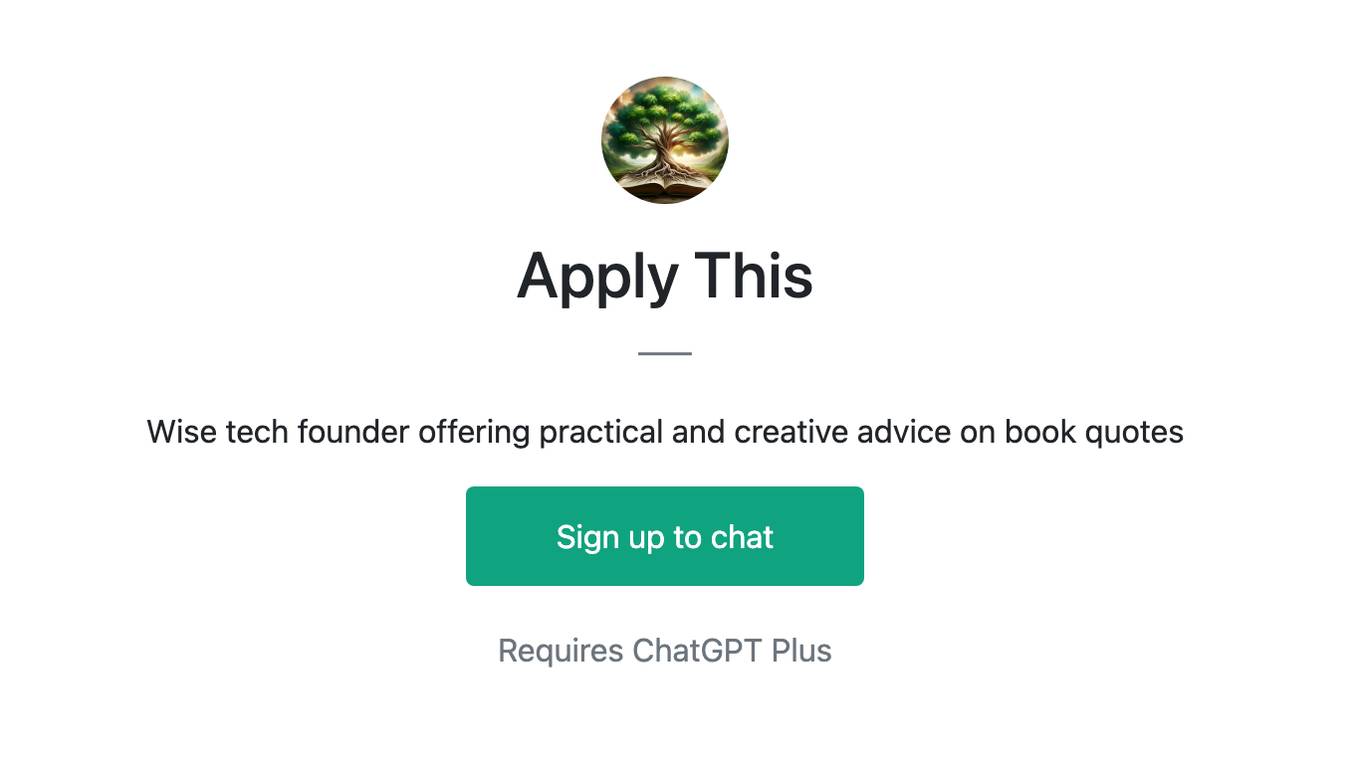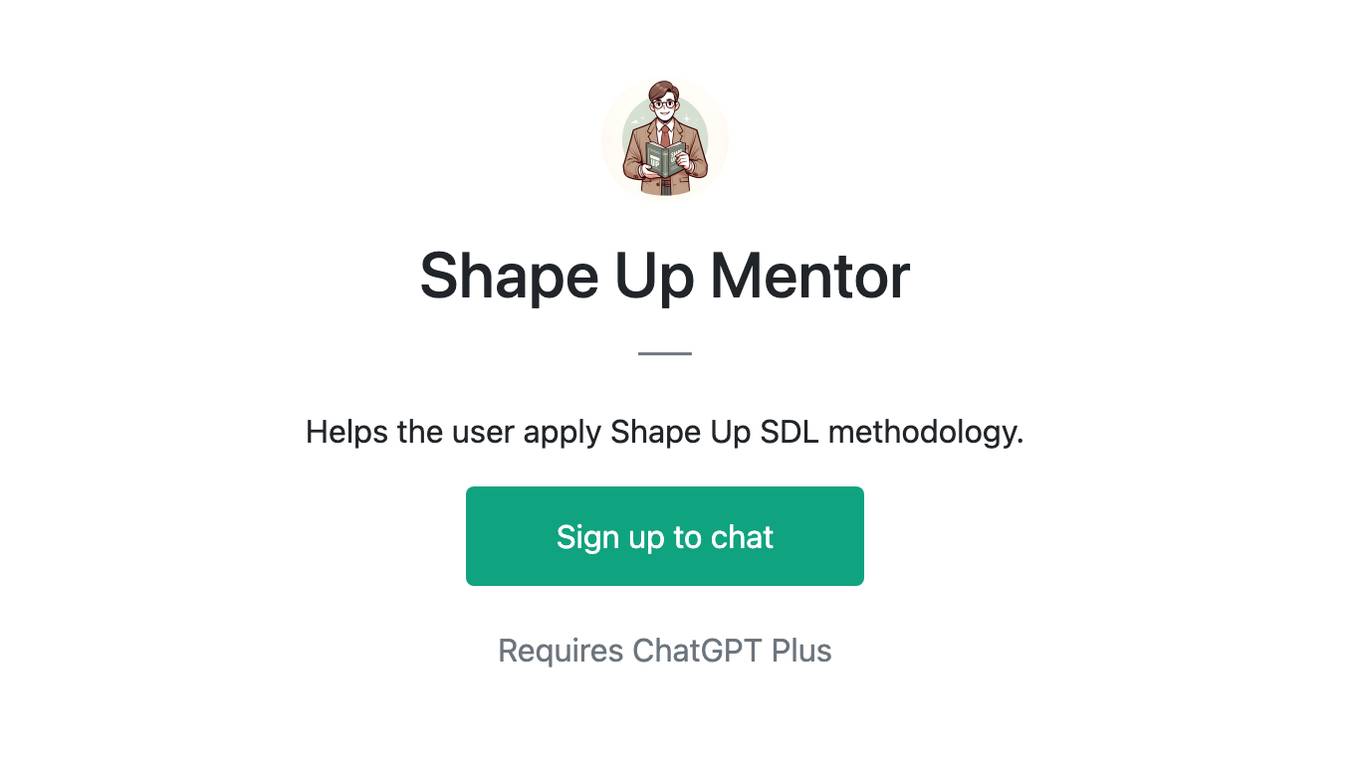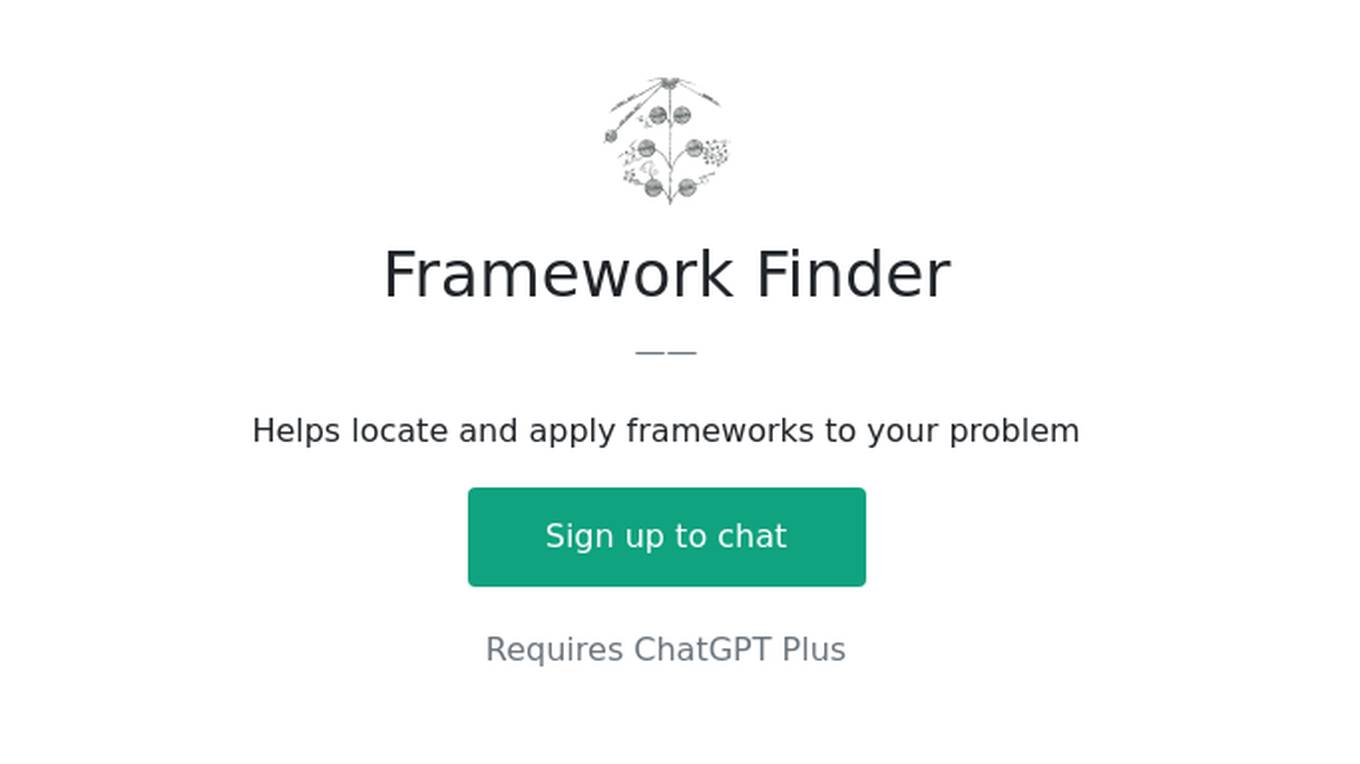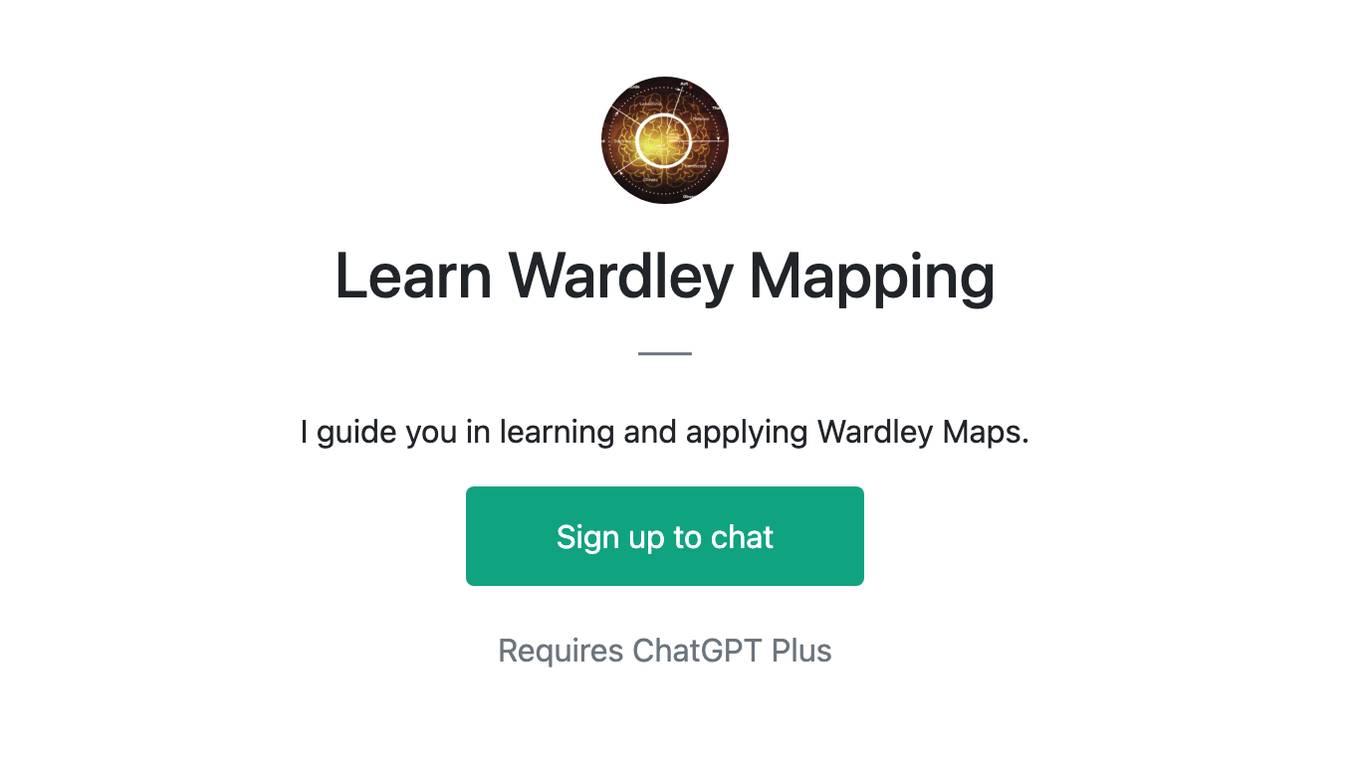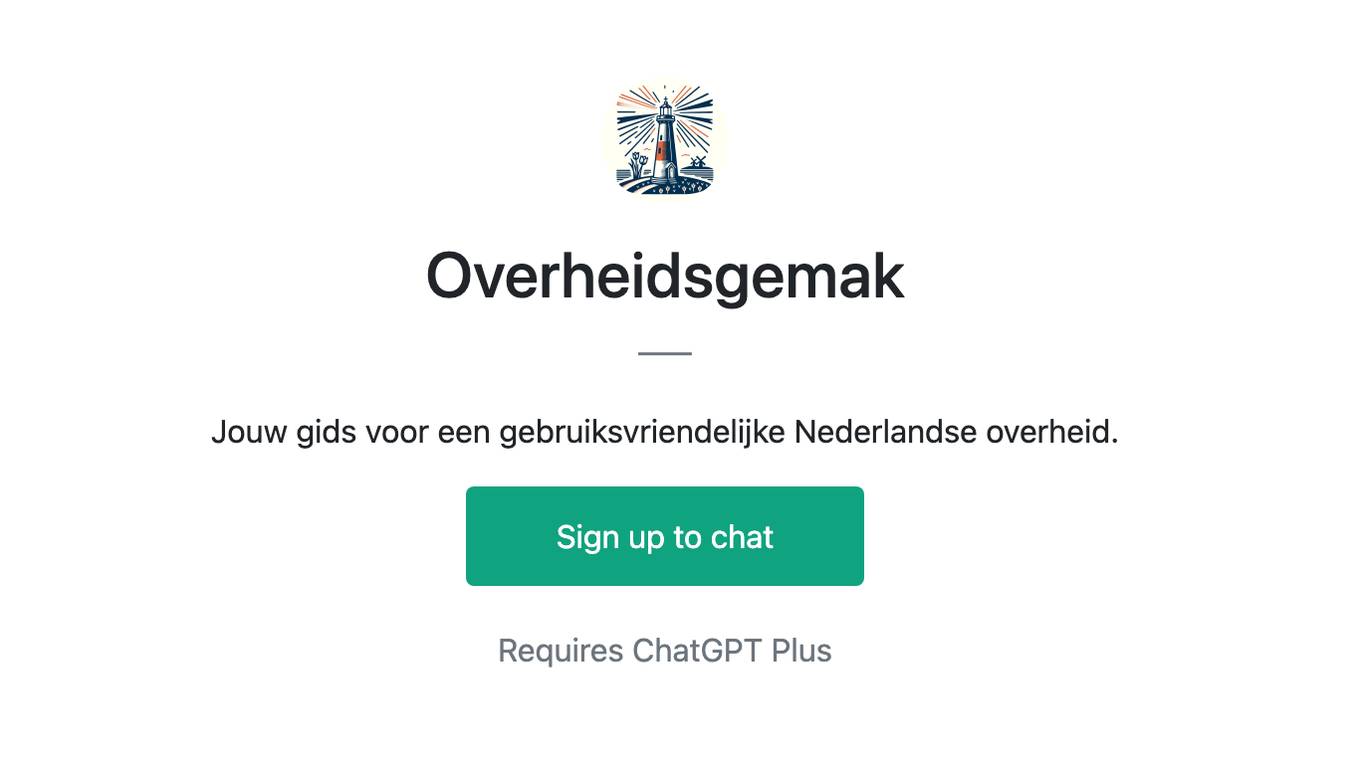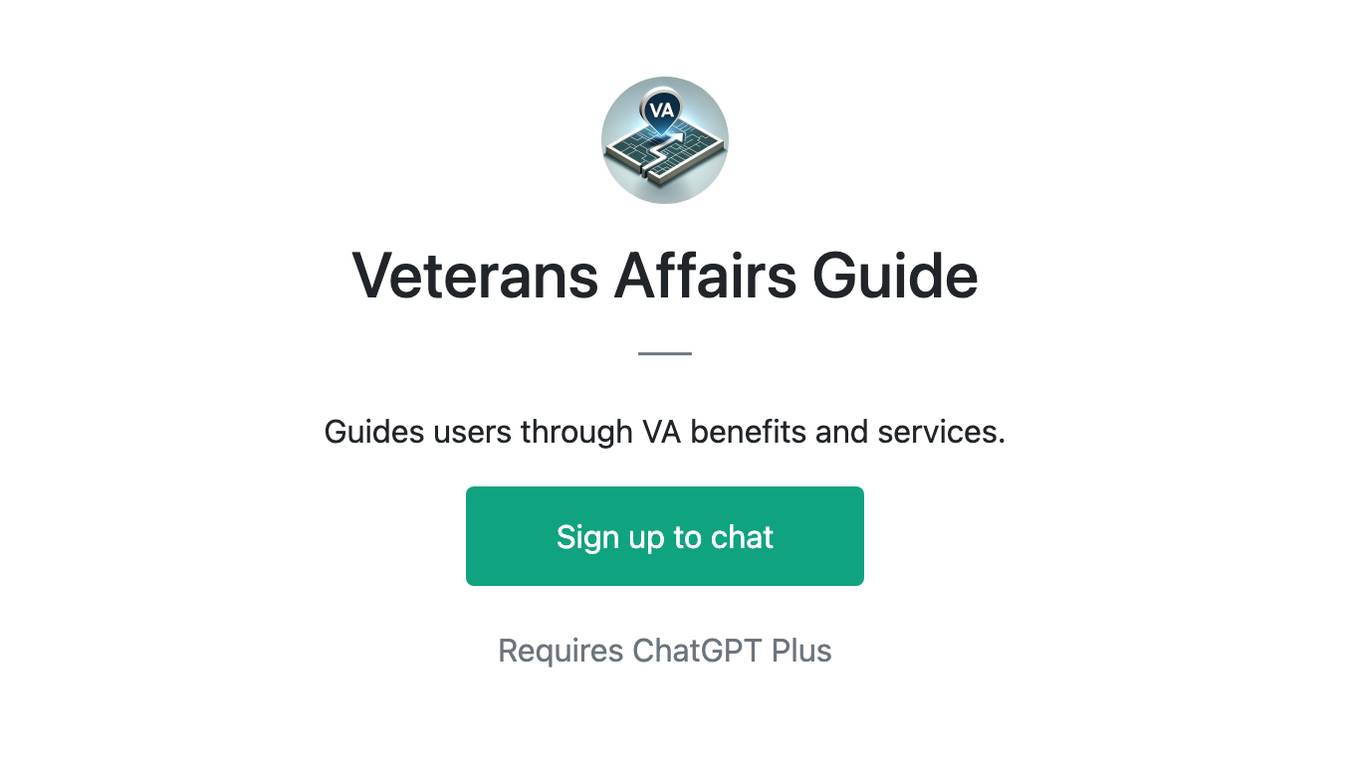Best AI tools for< apply stoic principles >
20 - AI tool Sites

Marcus Aurelius AI
Marcus Aurelius AI is a personal Stoic mentor that helps you conquer life's challenges. It offers daily Stoic lessons, personalized mentorship, and a community of like-minded individuals. With Marcus Aurelius AI, you can learn to apply Stoic principles to your daily life and live a more fulfilling and meaningful life.

Apply AI
This website provides a platform for users to apply artificial intelligence (AI) to their work. Users can access a variety of AI tools and resources, including pre-trained models, datasets, and tutorials. The website also provides a community forum where users can connect with other AI enthusiasts and experts.
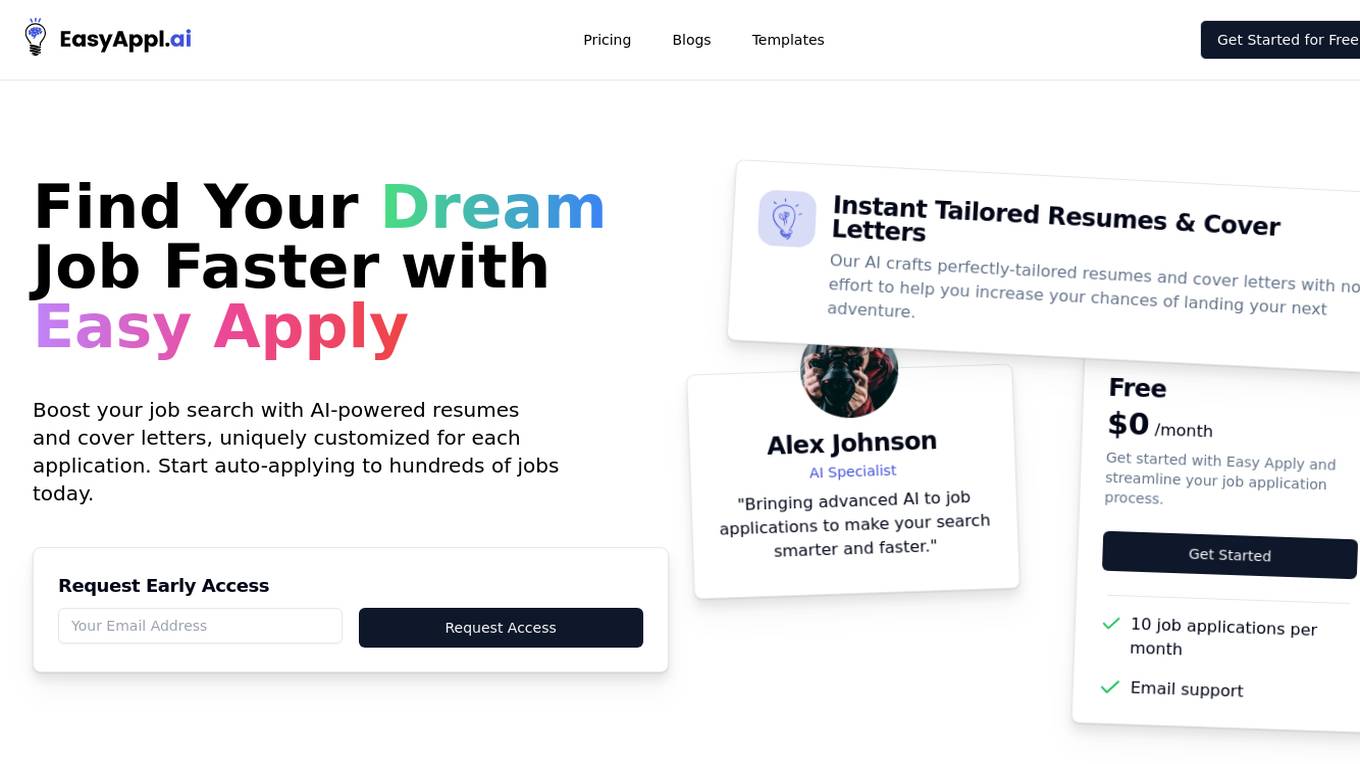
Easy Apply
Easy Apply is an AI-powered application designed to simplify and enhance the job search process. It offers advanced features such as AI-powered resumes and cover letters, personalized job recommendations, and a beautiful resume builder. With Easy Apply, users can auto-apply to hundreds of jobs, increasing their chances of landing their dream job. The application aims to make job hunting smarter, faster, and more efficient for job seekers.
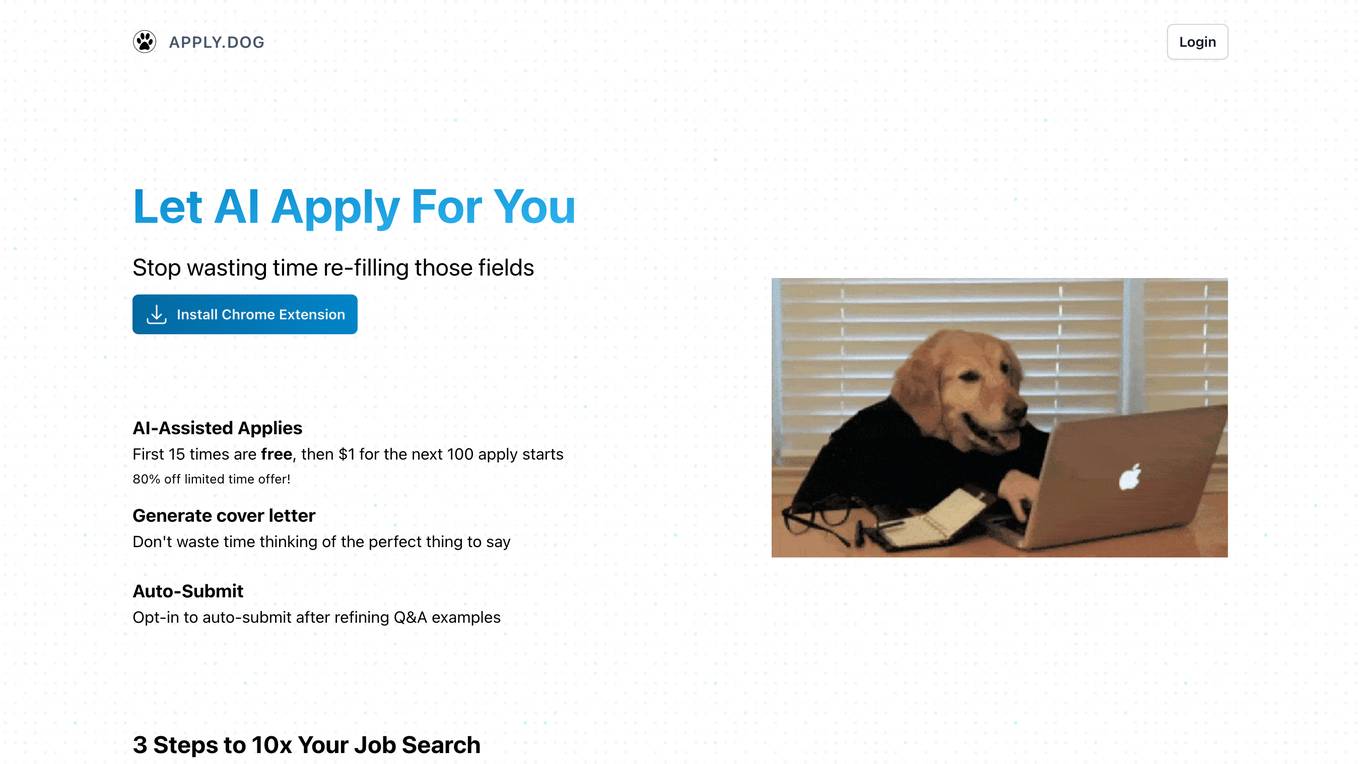
Apply.Dog
Apply.Dog is an AI-powered tool that automates the job application process. It fills out online job applications for you, saving you time and effort. With Apply.Dog, you can focus on finding the right job for you, while we take care of the tedious task of filling out applications.

Jobzi
Jobzi is an AI-powered job application bot that helps users find and apply for jobs in the UK. It uses machine learning to search for relevant job postings and automatically fill out and submit applications on behalf of users. Jobzi also provides users with a dashboard where they can track their applications and communicate with recruiters.

JobWizard
JobWizard is an AI-powered tool that helps job seekers autofill job applications. It uses natural language processing and machine learning to extract information from your resume and LinkedIn profile, and then automatically fills out the corresponding fields on job applications. This can save you a lot of time and hassle, and it can also help you to avoid making mistakes that could cost you the job.
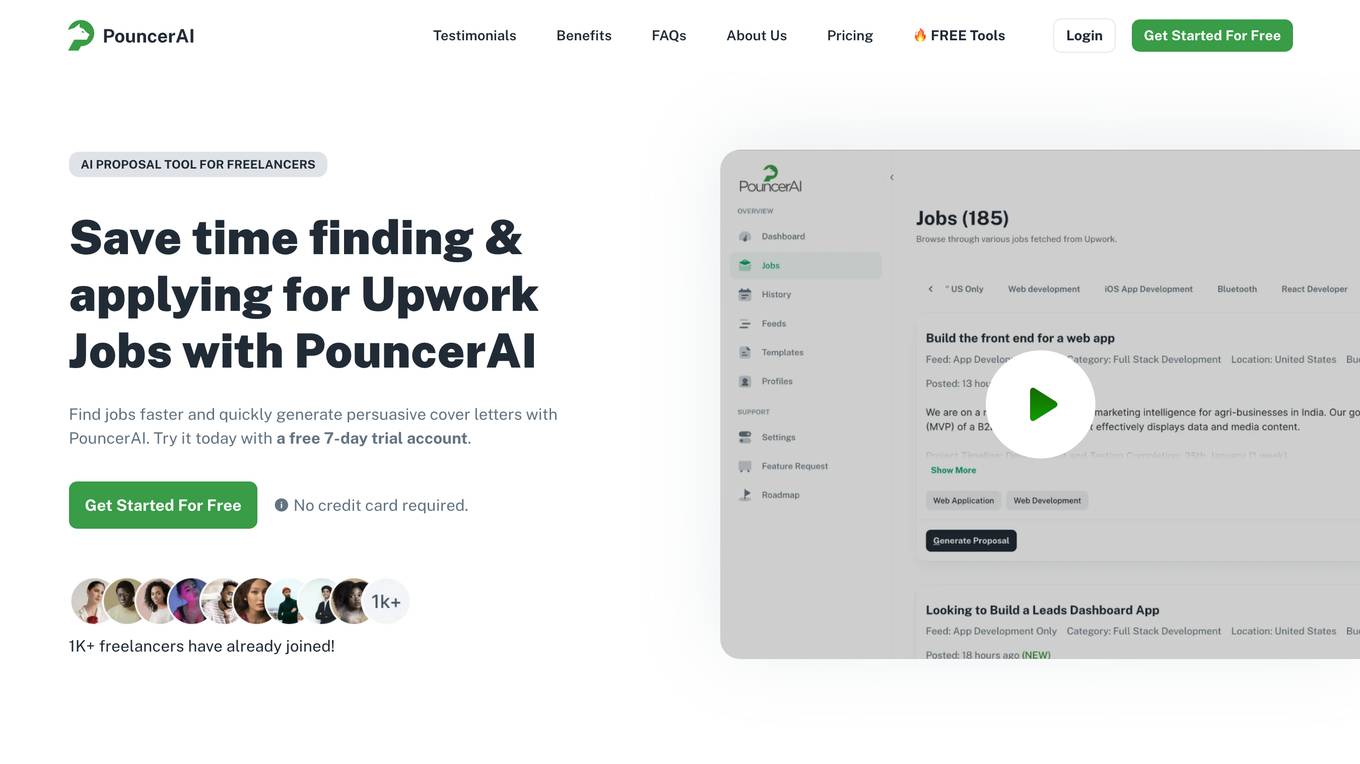
PouncerAI
PouncerAI is an AI-powered tool designed to help freelancers find and apply for Upwork jobs more efficiently. It offers features such as an Upwork RSS reader, real-time job alerts, an AI-assisted proposal generator, and team collaboration tools. PouncerAI aims to save freelancers time and effort in the job search and proposal writing process, allowing them to focus on delivering high-quality work.
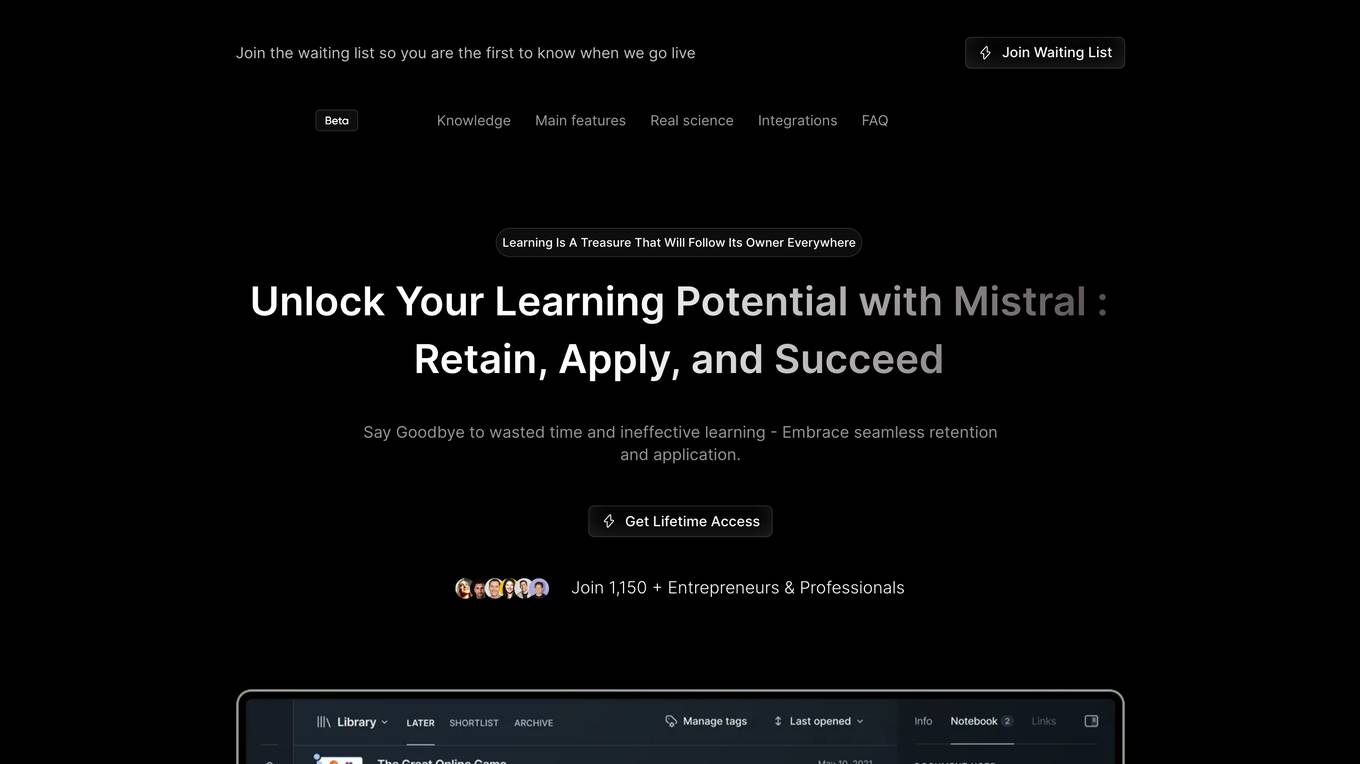
Mistral
Mistral is a knowledge management tool that helps users retain, apply, and succeed in their learning endeavors. It offers features such as seamless integration with popular note-taking tools, proven learning techniques for better retention, summarization of YouTube videos and text-based content, distraction-free reading, and resource management. Mistral is designed to help users overcome the challenges of information overload, wasteful distractions, and forgetfulness, empowering them to unlock their full learning potential.

Lensa AI
Lensa AI is a mobile application that uses artificial intelligence to enhance photos, remove distractions, apply filters and effects, and create unique AI avatars. It is designed to be easy to use, with one-tap retouching and instant results. Lensa AI is popular among influencers and celebrities, and has been downloaded over 840,000 times.

AIApply
AIApply is a suite of AI-powered job search tools designed to help job seekers land their dream jobs faster and easier. The platform offers a range of services, including a job application kit, AI resume builder, AI cover letter generator, AI job interview preparation, and more. AIApply's tools are powered by advanced AI models that have been trained on the most successful cover letters and resumes that have landed candidates high-paying jobs. The platform is easy to use and affordable, making it a great option for job seekers of all levels.
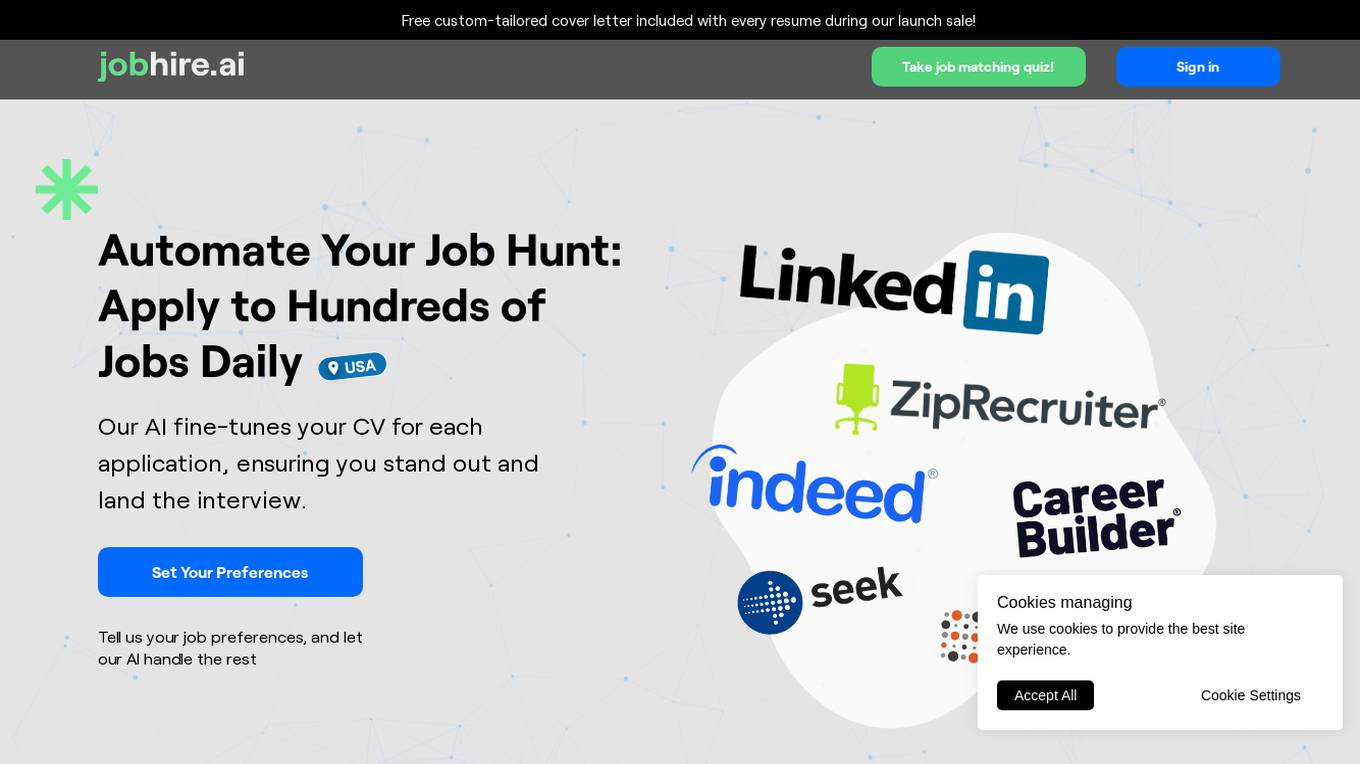
JobHire
JobHire is an AI-powered job search automation platform that helps users find and apply to relevant job openings. It uses artificial intelligence to analyze and recreate users' resumes, making them more attractive to potential employers. JobHire also automatically creates email addresses and uses them to send responses to suitable vacancies, modifying users' resumes for each specific position. Additionally, it tracks responses from employers and provides users with a dashboard to track their progress.
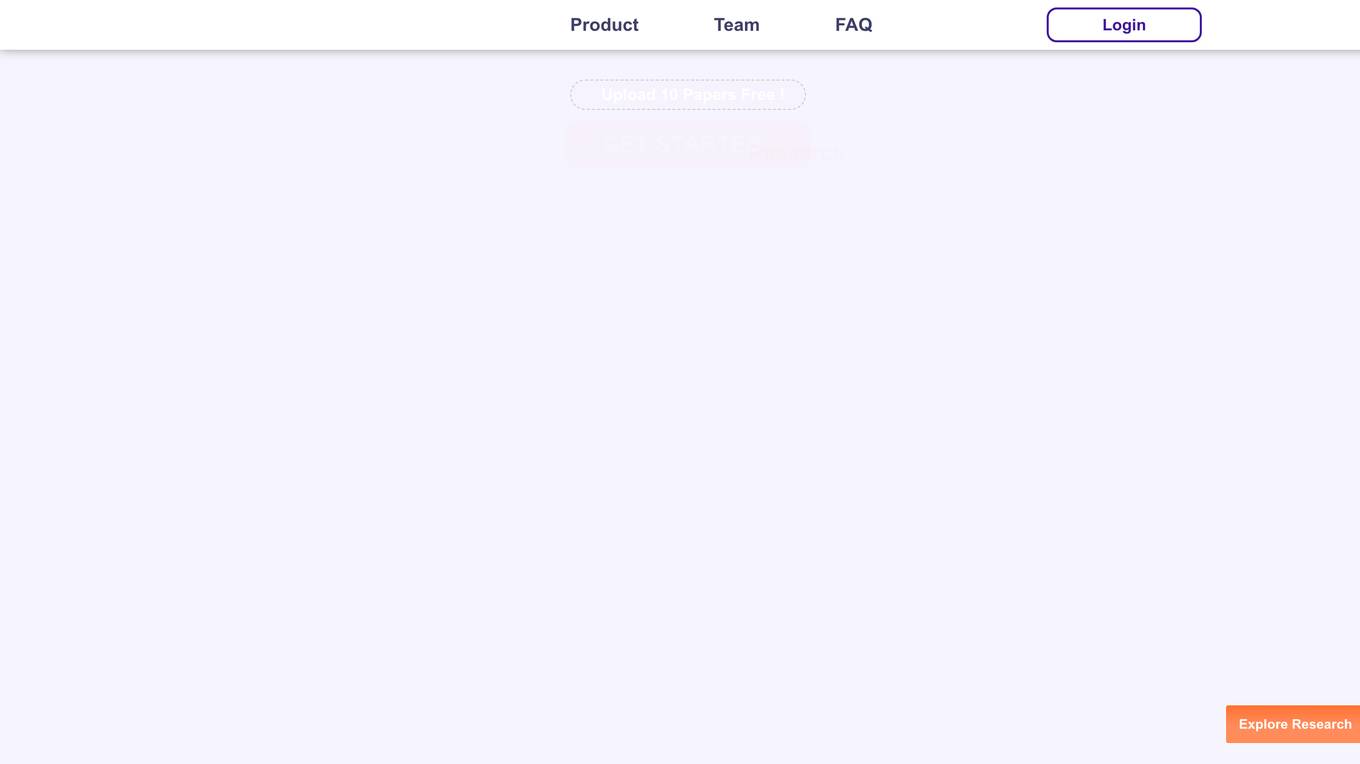
Papertalk.io
Papertalk.io is a research tool that helps users find, understand, and apply research papers. It uses AI to generate clear, concise explanations of papers, and it provides a chatbot to answer any questions users may have. Papertalk.io is designed to make research more accessible and approachable for everyone, regardless of their academic background.

Autojob
Autojob is a job search automation platform that helps users find jobs faster and more efficiently. It offers a range of features, including automatic job application, job filtering, and CV optimization. Autojob is designed to save users time and effort by automating the job search process.
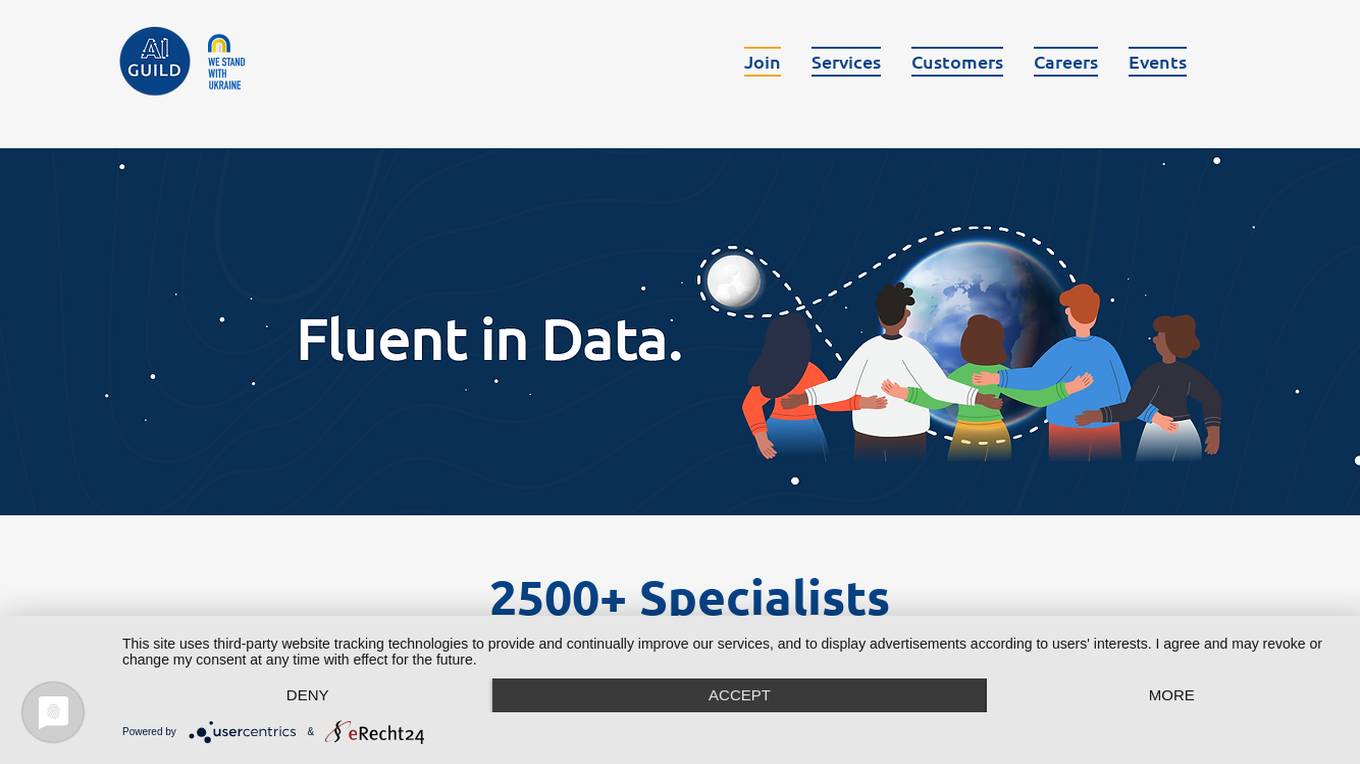
The AI Guild
The AI Guild is Europe's leading practitioner community in various AI-related fields such as Analytics Engineering, Data Science, Machine Learning, NLP, and more. It offers career support, exclusive connections, technical skills profiles, and growth opportunities for its members. Additionally, the AI Guild provides services for companies, including support in evaluating use cases, deploying to production, and scaling infrastructure.

Client-Side Exception Resolver
The website is a platform that seems to be encountering a client-side exception error. The error message indicates that there is an issue with the application on the user's end, prompting them to check the browser console for more details. It appears to be a technical issue that needs to be resolved to ensure the proper functioning of the application.
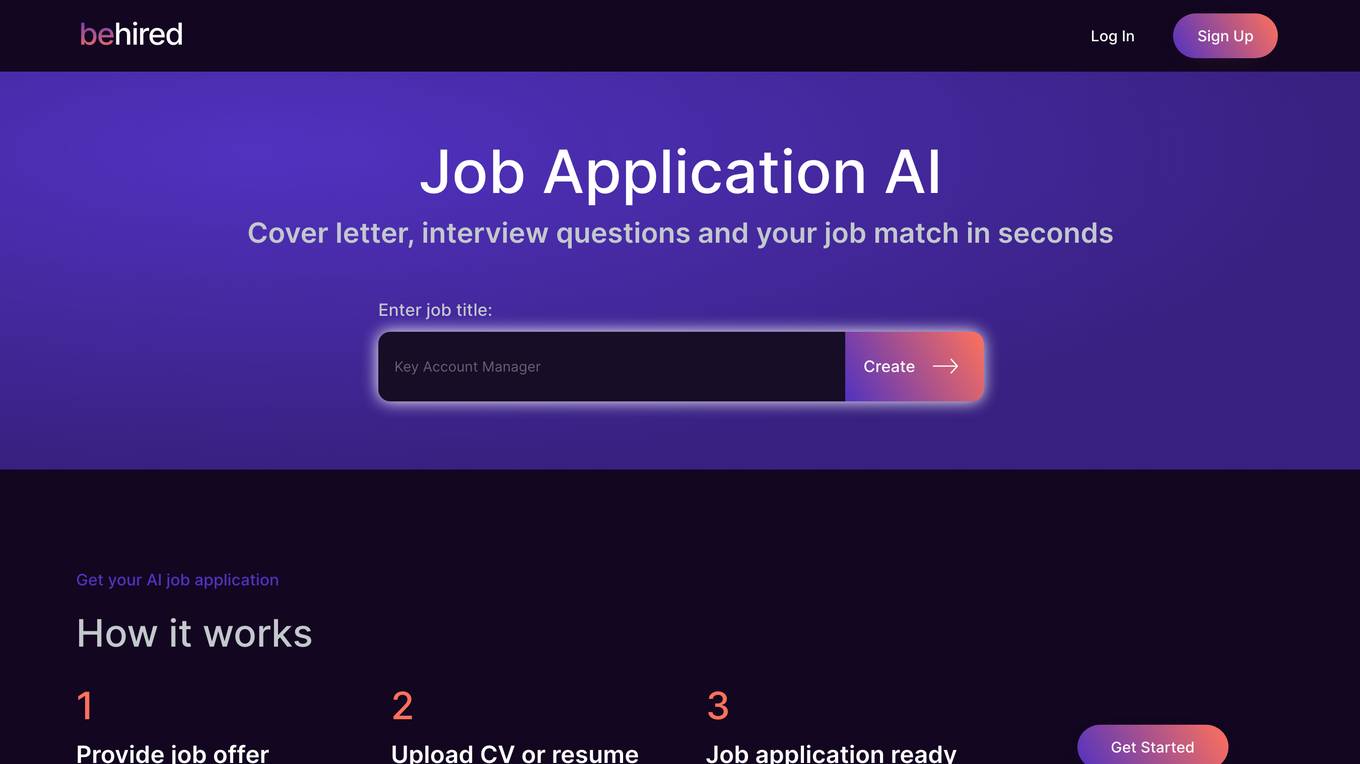
Behired
Behired is a job application AI that helps recruiters find the best candidates for their open positions. It uses artificial intelligence to screen resumes, identify top talent, and schedule interviews. Behired also provides recruiters with tools to track their progress and manage their hiring process.
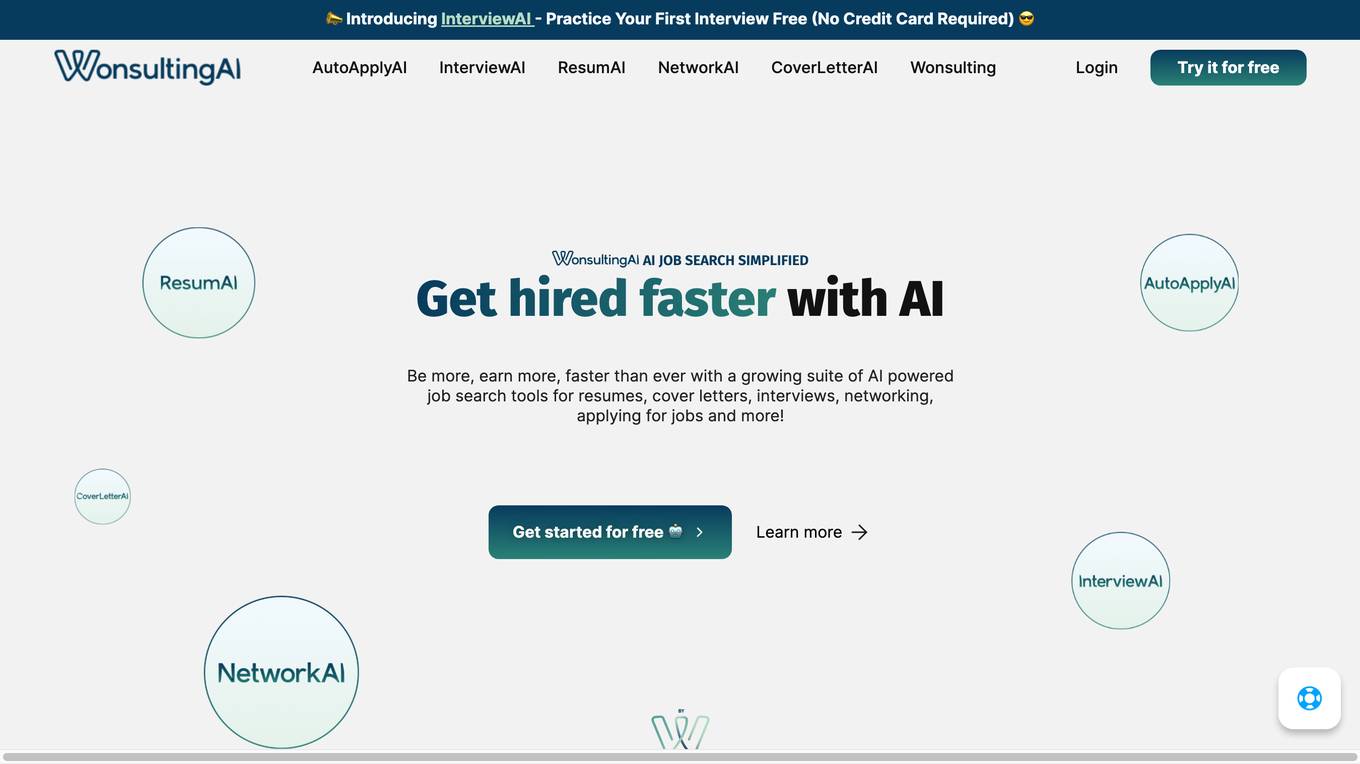
WonsultingAI
WonsultingAI is a suite of AI-powered job search tools designed to help job seekers create professional resumes, auto-apply to jobs, create outstanding cover letters, and get professional messages for networking. The platform includes ResumAI, NetworkAI, CoverLetterAI, AutoApplyAI, and InterviewAI, each designed to address specific aspects of the job search process. WonsultingAI aims to empower job seekers from all backgrounds by providing them with the tools and resources they need to succeed in today's competitive job market.
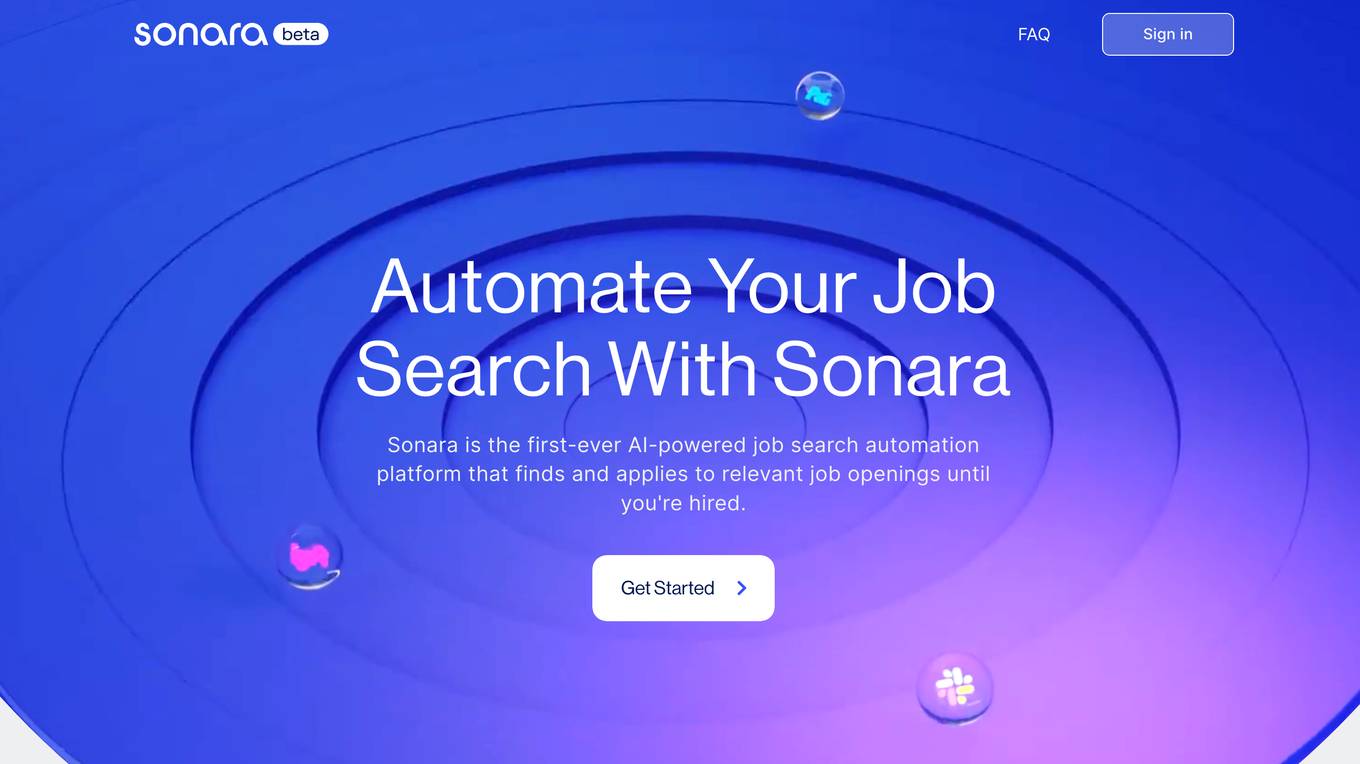
Sonara
Sonara is an AI-powered job search automation platform that finds and applies to relevant job openings on your behalf. It uses AI to identify the top job opportunities on the market that are best suited for you and sends out job applications on your behalf. Sonara is designed to help you easily find your dream job, uncovering hidden opportunities you never knew existed.
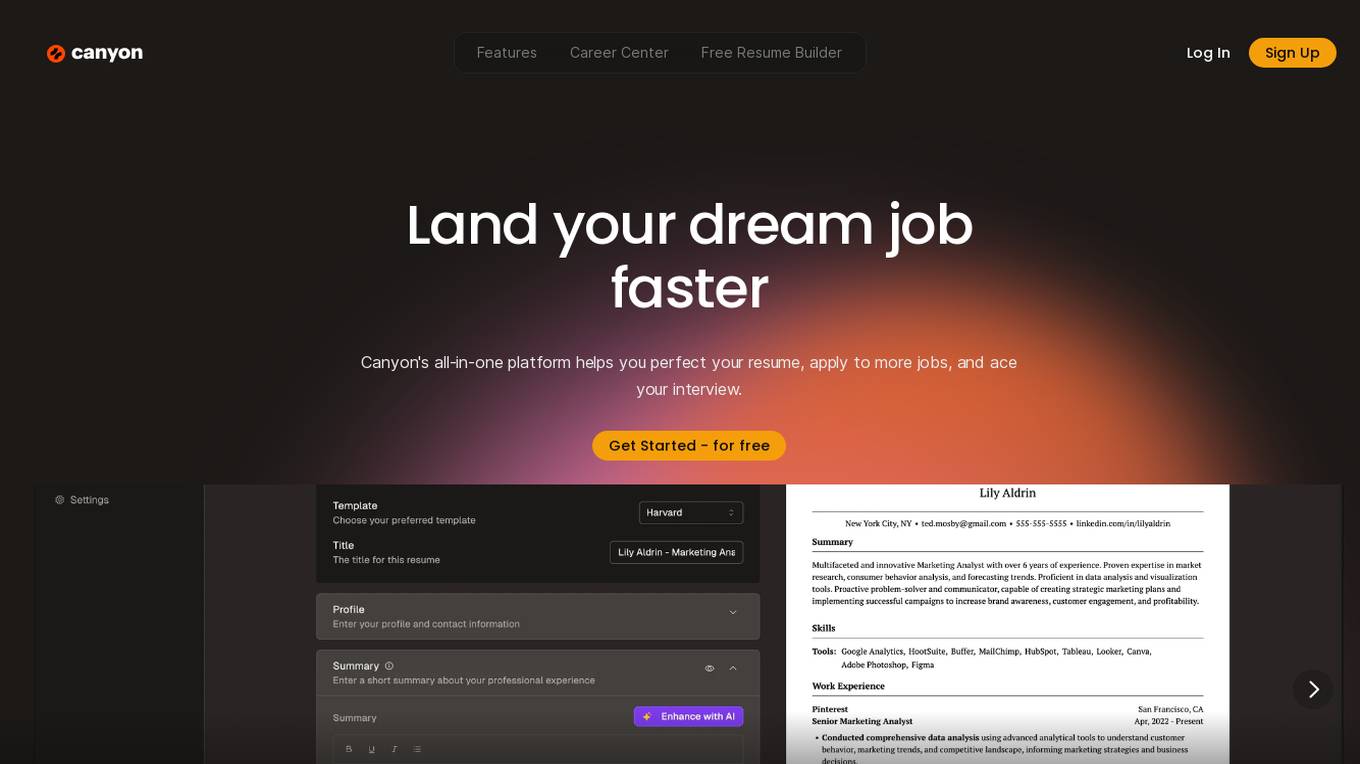
Canyon
Canyon is an all-in-one platform that helps job seekers perfect their resumes, apply to more jobs, and ace their interviews. It offers a range of AI-powered tools, including an AI Resume Builder, Canyon Resume Score, Autofill Job Applications with One Click, Manage Job Applications, and AI Mock Interview. With Canyon, job seekers can build outstanding resumes, optimize their applications for each job, and practice their interviewing skills.
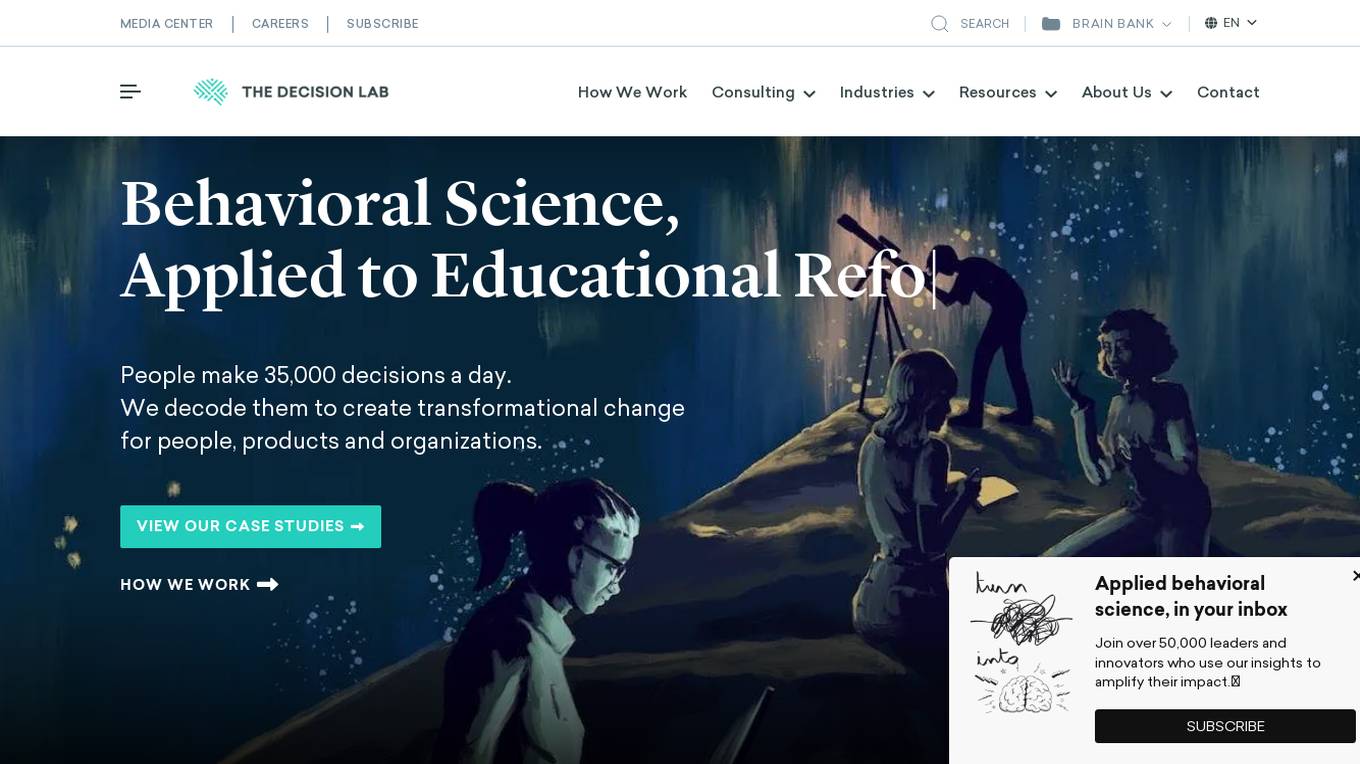
The Decision Lab
The Decision Lab is an AI-powered platform that applies behavioral science to create transformational change for individuals, products, and organizations. Using machine learning and AI, the platform delivers hyper-personalization, designs people-centered products and services, and leverages behavioral science to achieve operational excellence. The platform helps in understanding consumer decision-making, generating positive behaviors, and building world-class digital products with behavioral science. It fosters holistic wellness, unlocks product potential, and empowers individuals to take control of their finances. The Decision Lab offers insights and interventions to help organizations make better decisions and create meaningful impact through evidence-based choice.
20 - Open Source AI Tools
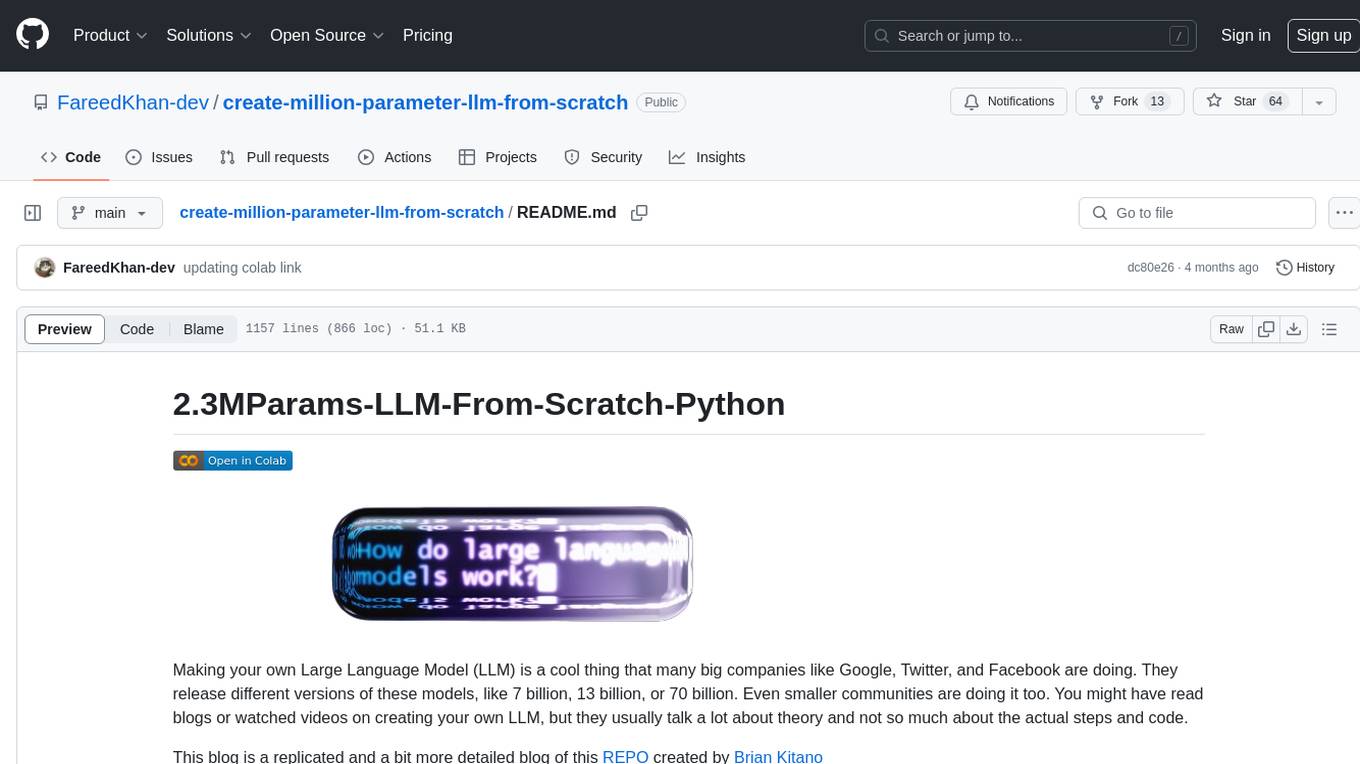
create-million-parameter-llm-from-scratch
The 'create-million-parameter-llm-from-scratch' repository provides a detailed guide on creating a Large Language Model (LLM) with 2.3 million parameters from scratch. The blog replicates the LLaMA approach, incorporating concepts like RMSNorm for pre-normalization, SwiGLU activation function, and Rotary Embeddings. The model is trained on a basic dataset to demonstrate the ease of creating a million-parameter LLM without the need for a high-end GPU.
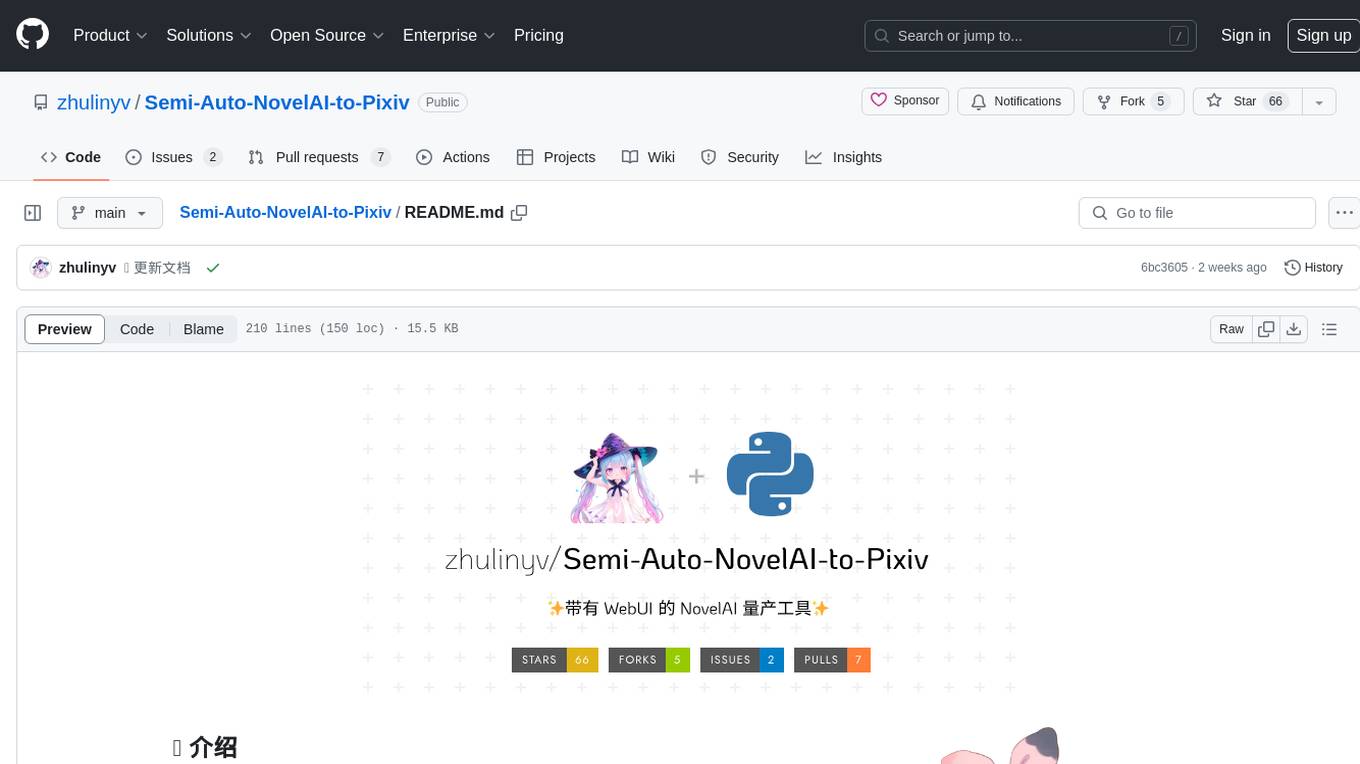
Semi-Auto-NovelAI-to-Pixiv
Semi-Auto-NovelAI-to-Pixiv is a powerful tool that enables batch image generation with NovelAI, along with various other useful features in a super user-friendly interface. It allows users to create images, generate random images, upload images to Pixiv, apply filters, enhance images, add watermarks, and more. The tool also supports video-to-image conversion and various image manipulation tasks. It offers a seamless experience for users looking to automate image processing tasks.
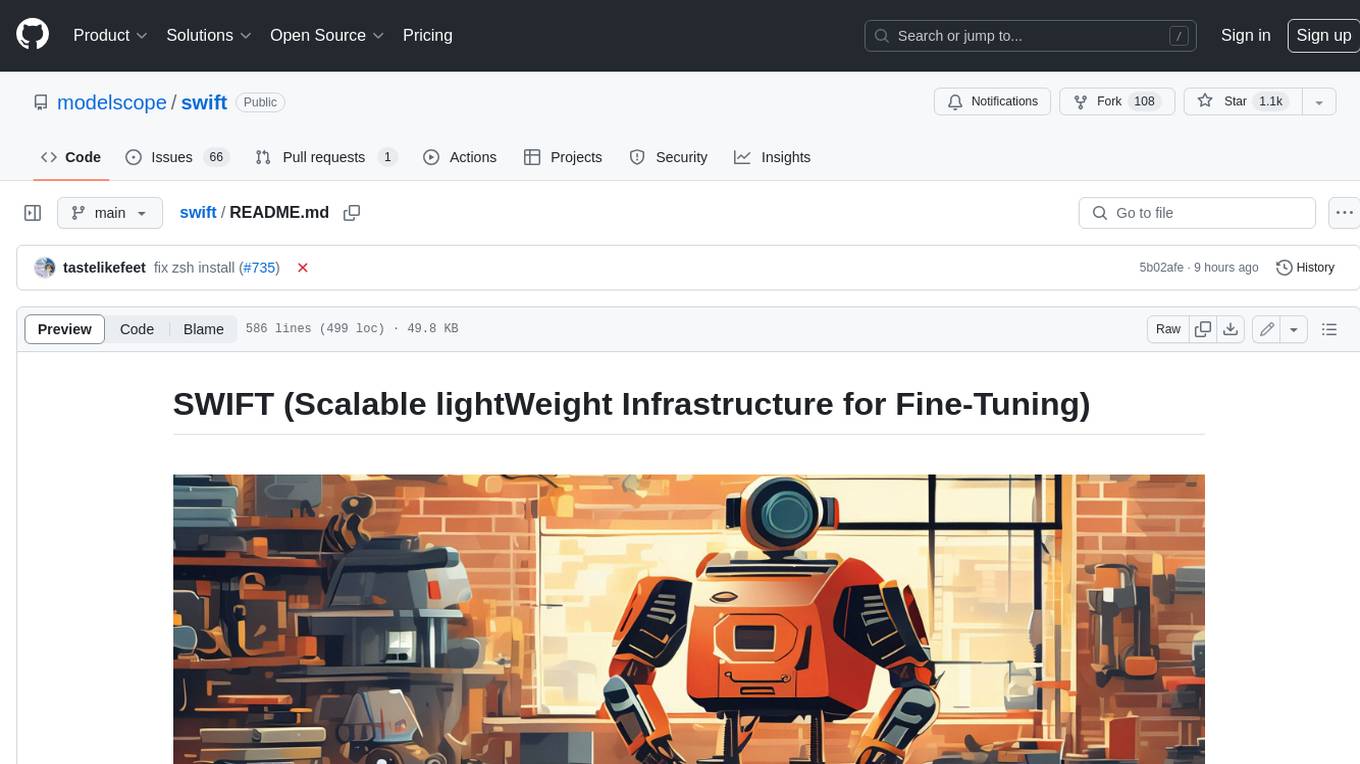
swift
SWIFT (Scalable lightWeight Infrastructure for Fine-Tuning) supports training, inference, evaluation and deployment of nearly **200 LLMs and MLLMs** (multimodal large models). Developers can directly apply our framework to their own research and production environments to realize the complete workflow from model training and evaluation to application. In addition to supporting the lightweight training solutions provided by [PEFT](https://github.com/huggingface/peft), we also provide a complete **Adapters library** to support the latest training techniques such as NEFTune, LoRA+, LLaMA-PRO, etc. This adapter library can be used directly in your own custom workflow without our training scripts. To facilitate use by users unfamiliar with deep learning, we provide a Gradio web-ui for controlling training and inference, as well as accompanying deep learning courses and best practices for beginners. Additionally, we are expanding capabilities for other modalities. Currently, we support full-parameter training and LoRA training for AnimateDiff.
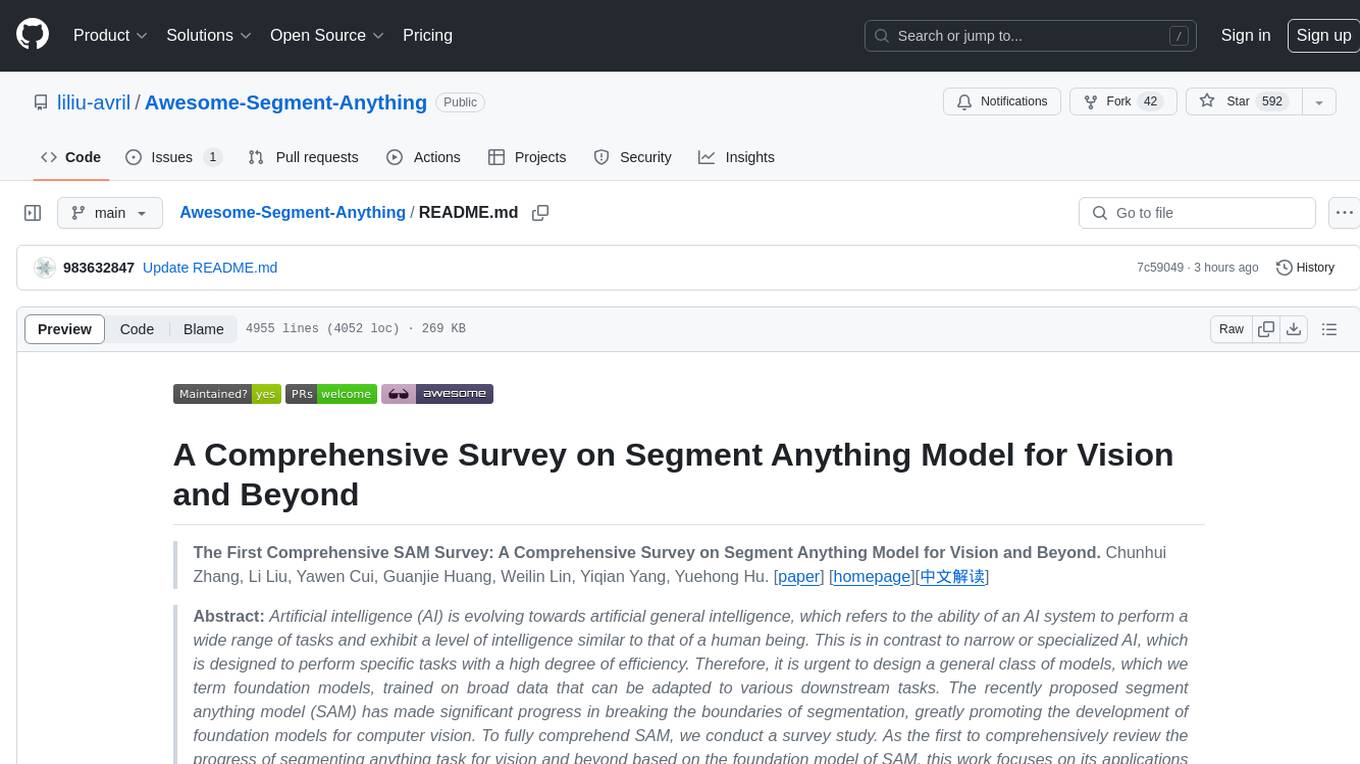
Awesome-Segment-Anything
Awesome-Segment-Anything is a powerful tool for segmenting and extracting information from various types of data. It provides a user-friendly interface to easily define segmentation rules and apply them to text, images, and other data formats. The tool supports both supervised and unsupervised segmentation methods, allowing users to customize the segmentation process based on their specific needs. With its versatile functionality and intuitive design, Awesome-Segment-Anything is ideal for data analysts, researchers, content creators, and anyone looking to efficiently extract valuable insights from complex datasets.
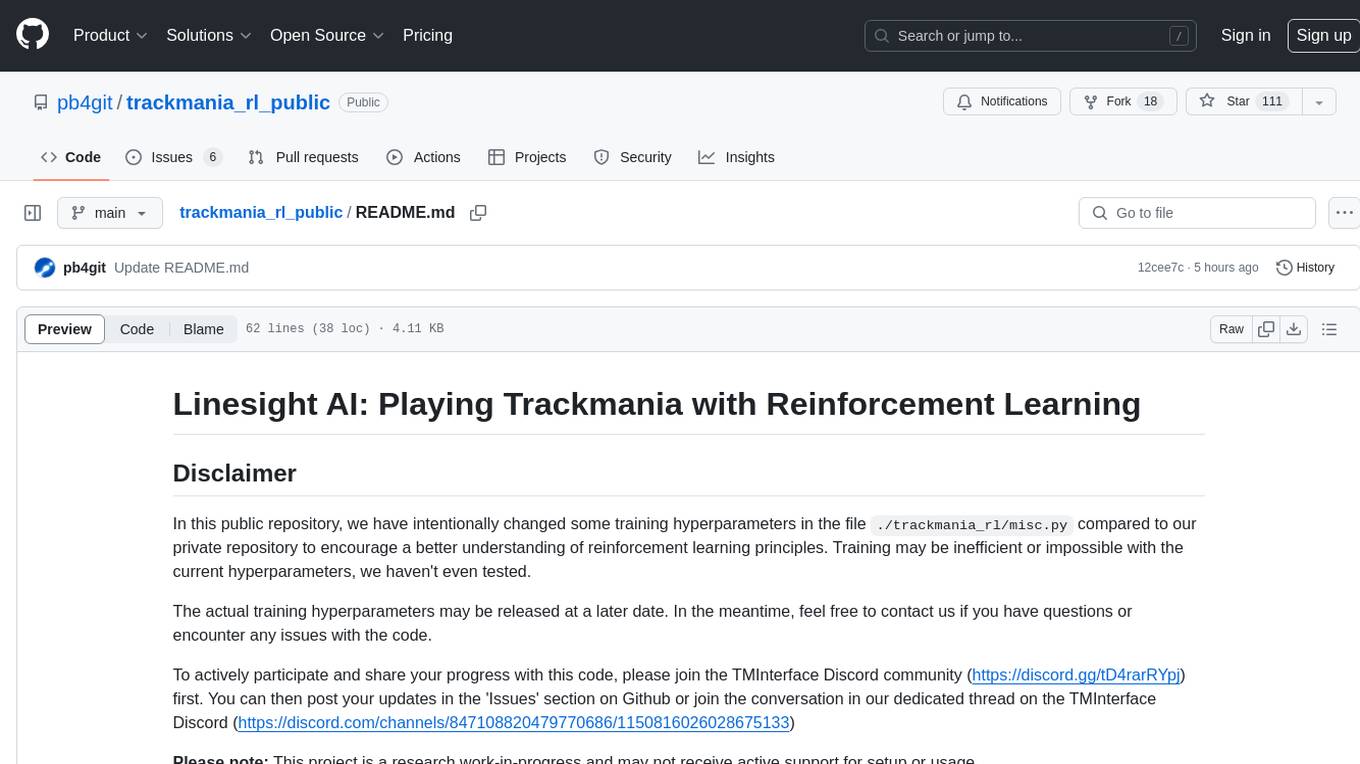
trackmania_rl_public
This repository contains the reinforcement learning training code for Trackmania AI with Reinforcement Learning. It is a research work-in-progress project that aims to apply reinforcement learning principles to play Trackmania. The code is constantly evolving and may not be clean or easily usable. The training hyperparameters are intentionally changed in the public repository to encourage understanding of reinforcement learning principles. The project may not receive active support for setup or usage at the moment.
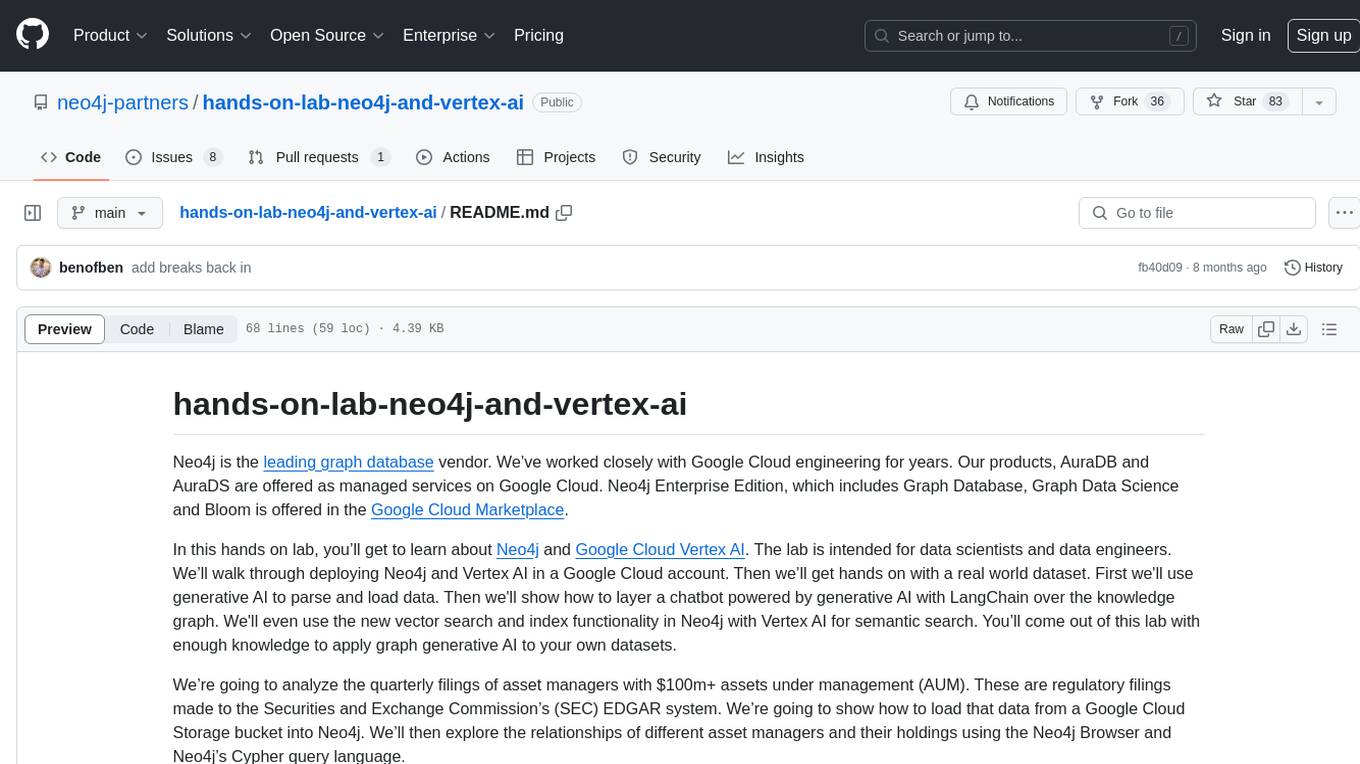
hands-on-lab-neo4j-and-vertex-ai
This repository provides a hands-on lab for learning about Neo4j and Google Cloud Vertex AI. It is intended for data scientists and data engineers to deploy Neo4j and Vertex AI in a Google Cloud account, work with real-world datasets, apply generative AI, build a chatbot over a knowledge graph, and use vector search and index functionality for semantic search. The lab focuses on analyzing quarterly filings of asset managers with $100m+ assets under management, exploring relationships using Neo4j Browser and Cypher query language, and discussing potential applications in capital markets such as algorithmic trading and securities master data management.
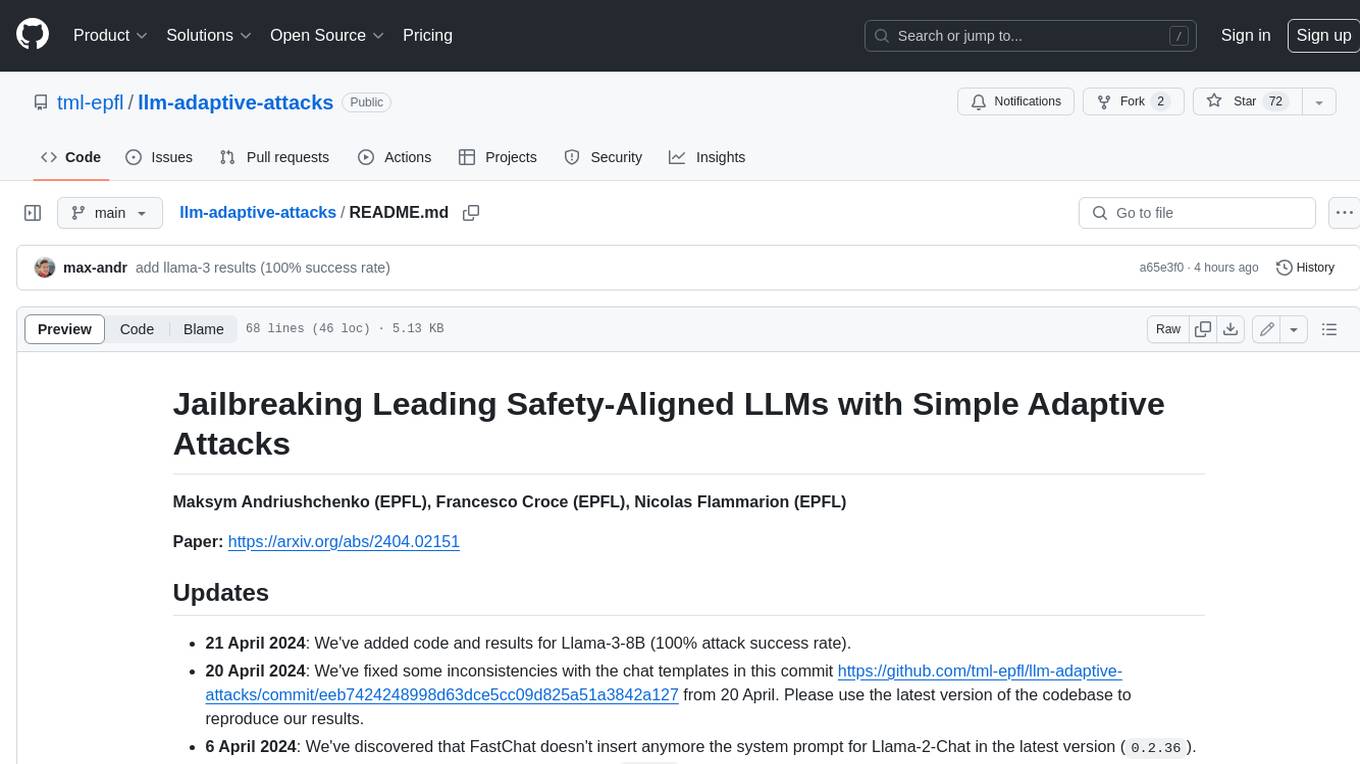
llm-adaptive-attacks
This repository contains code and results for jailbreaking leading safety-aligned LLMs with simple adaptive attacks. We show that even the most recent safety-aligned LLMs are not robust to simple adaptive jailbreaking attacks. We demonstrate how to successfully leverage access to logprobs for jailbreaking: we initially design an adversarial prompt template (sometimes adapted to the target LLM), and then we apply random search on a suffix to maximize the target logprob (e.g., of the token ``Sure''), potentially with multiple restarts. In this way, we achieve nearly 100% attack success rate---according to GPT-4 as a judge---on GPT-3.5/4, Llama-2-Chat-7B/13B/70B, Gemma-7B, and R2D2 from HarmBench that was adversarially trained against the GCG attack. We also show how to jailbreak all Claude models---that do not expose logprobs---via either a transfer or prefilling attack with 100% success rate. In addition, we show how to use random search on a restricted set of tokens for finding trojan strings in poisoned models---a task that shares many similarities with jailbreaking---which is the algorithm that brought us the first place in the SaTML'24 Trojan Detection Competition. The common theme behind these attacks is that adaptivity is crucial: different models are vulnerable to different prompting templates (e.g., R2D2 is very sensitive to in-context learning prompts), some models have unique vulnerabilities based on their APIs (e.g., prefilling for Claude), and in some settings it is crucial to restrict the token search space based on prior knowledge (e.g., for trojan detection).
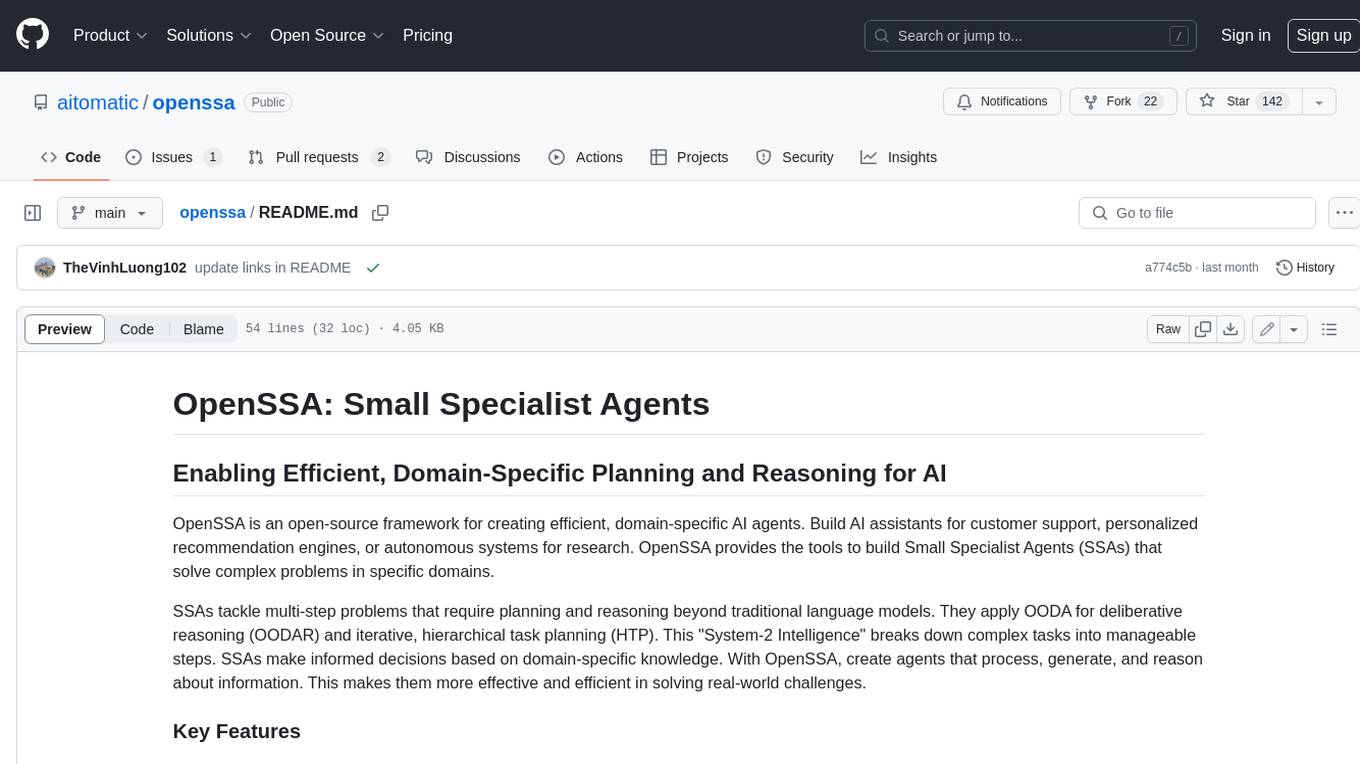
openssa
OpenSSA is an open-source framework for creating efficient, domain-specific AI agents. It enables the development of Small Specialist Agents (SSAs) that solve complex problems in specific domains. SSAs tackle multi-step problems that require planning and reasoning beyond traditional language models. They apply OODA for deliberative reasoning (OODAR) and iterative, hierarchical task planning (HTP). This "System-2 Intelligence" breaks down complex tasks into manageable steps. SSAs make informed decisions based on domain-specific knowledge. With OpenSSA, users can create agents that process, generate, and reason about information, making them more effective and efficient in solving real-world challenges.
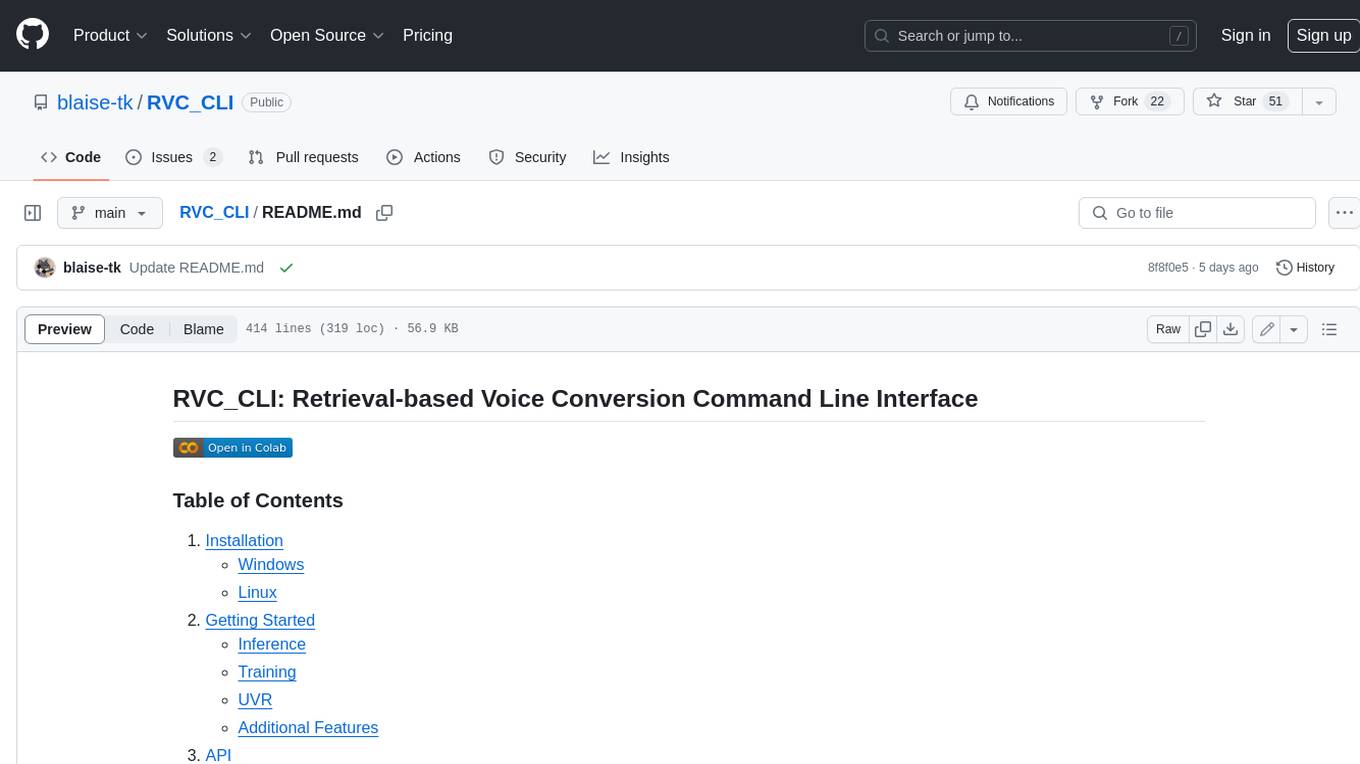
RVC_CLI
**RVC_CLI: Retrieval-based Voice Conversion Command Line Interface** This command-line interface (CLI) provides a comprehensive set of tools for voice conversion, enabling you to modify the pitch, timbre, and other characteristics of audio recordings. It leverages advanced machine learning models to achieve realistic and high-quality voice conversions. **Key Features:** * **Inference:** Convert the pitch and timbre of audio in real-time or process audio files in batch mode. * **TTS Inference:** Synthesize speech from text using a variety of voices and apply voice conversion techniques. * **Training:** Train custom voice conversion models to meet specific requirements. * **Model Management:** Extract, blend, and analyze models to fine-tune and optimize performance. * **Audio Analysis:** Inspect audio files to gain insights into their characteristics. * **API:** Integrate the CLI's functionality into your own applications or workflows. **Applications:** The RVC_CLI finds applications in various domains, including: * **Music Production:** Create unique vocal effects, harmonies, and backing vocals. * **Voiceovers:** Generate voiceovers with different accents, emotions, and styles. * **Audio Editing:** Enhance or modify audio recordings for podcasts, audiobooks, and other content. * **Research and Development:** Explore and advance the field of voice conversion technology. **For Jobs:** * Audio Engineer * Music Producer * Voiceover Artist * Audio Editor * Machine Learning Engineer **AI Keywords:** * Voice Conversion * Pitch Shifting * Timbre Modification * Machine Learning * Audio Processing **For Tasks:** * Convert Pitch * Change Timbre * Synthesize Speech * Train Model * Analyze Audio
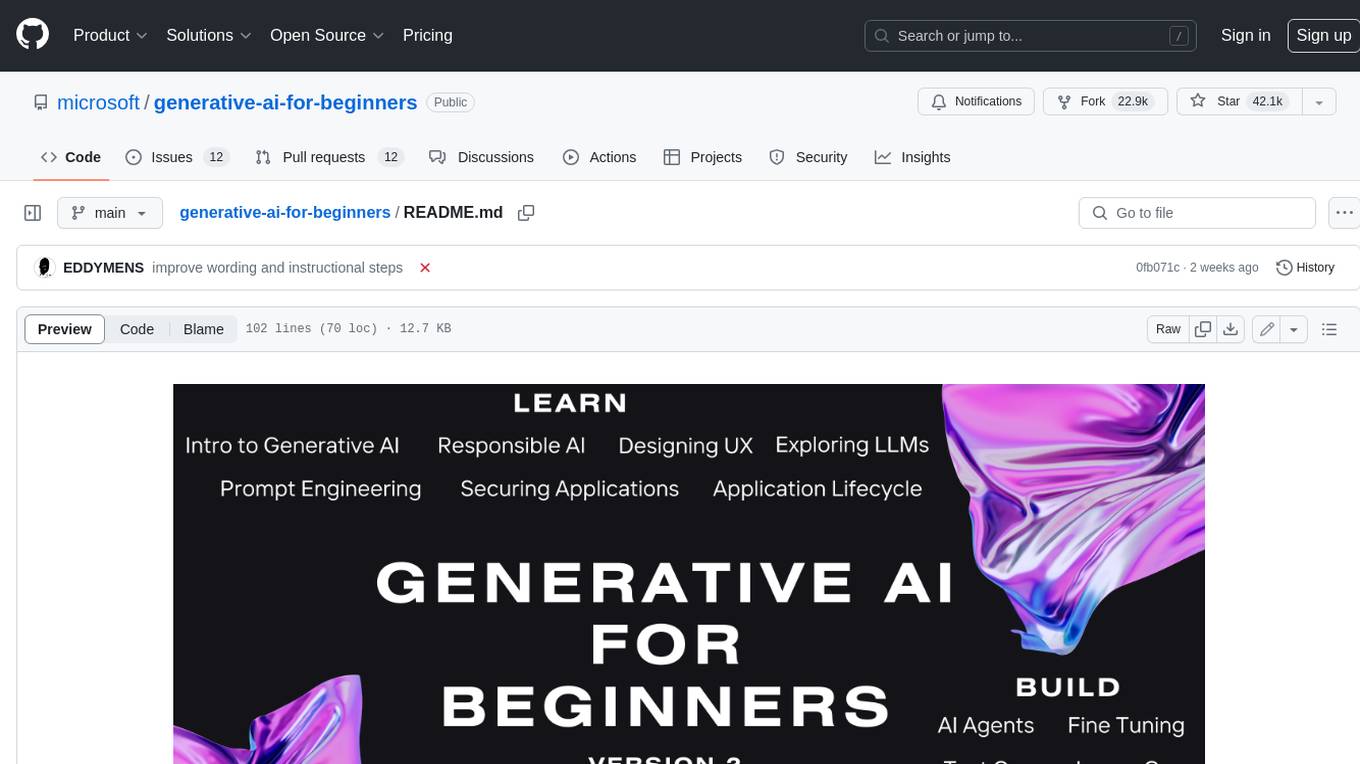
generative-ai-for-beginners
This course has 18 lessons. Each lesson covers its own topic so start wherever you like! Lessons are labeled either "Learn" lessons explaining a Generative AI concept or "Build" lessons that explain a concept and code examples in both **Python** and **TypeScript** when possible. Each lesson also includes a "Keep Learning" section with additional learning tools. **What You Need** * Access to the Azure OpenAI Service **OR** OpenAI API - _Only required to complete coding lessons_ * Basic knowledge of Python or Typescript is helpful - *For absolute beginners check out these Python and TypeScript courses. * A Github account to fork this entire repo to your own GitHub account We have created a **Course Setup** lesson to help you with setting up your development environment. Don't forget to star (🌟) this repo to find it easier later. ## 🧠 Ready to Deploy? If you are looking for more advanced code samples, check out our collection of Generative AI Code Samples in both **Python** and **TypeScript**. ## 🗣️ Meet Other Learners, Get Support Join our official AI Discord server to meet and network with other learners taking this course and get support. ## 🚀 Building a Startup? Sign up for Microsoft for Startups Founders Hub to receive **free OpenAI credits** and up to **$150k towards Azure credits to access OpenAI models through Azure OpenAI Services**. ## 🙏 Want to help? Do you have suggestions or found spelling or code errors? Raise an issue or Create a pull request ## 📂 Each lesson includes: * A short video introduction to the topic * A written lesson located in the README * Python and TypeScript code samples supporting Azure OpenAI and OpenAI API * Links to extra resources to continue your learning ## 🗃️ Lessons | | Lesson Link | Description | Additional Learning | | :-: | :------------------------------------------------------------------------------------------------------------------------------------------: | :---------------------------------------------------------------------------------------------: | ------------------------------------------------------------------------------ | | 00 | Course Setup | **Learn:** How to Setup Your Development Environment | Learn More | | 01 | Introduction to Generative AI and LLMs | **Learn:** Understanding what Generative AI is and how Large Language Models (LLMs) work. | Learn More | | 02 | Exploring and comparing different LLMs | **Learn:** How to select the right model for your use case | Learn More | | 03 | Using Generative AI Responsibly | **Learn:** How to build Generative AI Applications responsibly | Learn More | | 04 | Understanding Prompt Engineering Fundamentals | **Learn:** Hands-on Prompt Engineering Best Practices | Learn More | | 05 | Creating Advanced Prompts | **Learn:** How to apply prompt engineering techniques that improve the outcome of your prompts. | Learn More | | 06 | Building Text Generation Applications | **Build:** A text generation app using Azure OpenAI | Learn More | | 07 | Building Chat Applications | **Build:** Techniques for efficiently building and integrating chat applications. | Learn More | | 08 | Building Search Apps Vector Databases | **Build:** A search application that uses Embeddings to search for data. | Learn More | | 09 | Building Image Generation Applications | **Build:** A image generation application | Learn More | | 10 | Building Low Code AI Applications | **Build:** A Generative AI application using Low Code tools | Learn More | | 11 | Integrating External Applications with Function Calling | **Build:** What is function calling and its use cases for applications | Learn More | | 12 | Designing UX for AI Applications | **Learn:** How to apply UX design principles when developing Generative AI Applications | Learn More | | 13 | Securing Your Generative AI Applications | **Learn:** The threats and risks to AI systems and methods to secure these systems. | Learn More | | 14 | The Generative AI Application Lifecycle | **Learn:** The tools and metrics to manage the LLM Lifecycle and LLMOps | Learn More | | 15 | Retrieval Augmented Generation (RAG) and Vector Databases | **Build:** An application using a RAG Framework to retrieve embeddings from a Vector Databases | Learn More | | 16 | Open Source Models and Hugging Face | **Build:** An application using open source models available on Hugging Face | Learn More | | 17 | AI Agents | **Build:** An application using an AI Agent Framework | Learn More | | 18 | Fine-Tuning LLMs | **Learn:** The what, why and how of fine-tuning LLMs | Learn More |
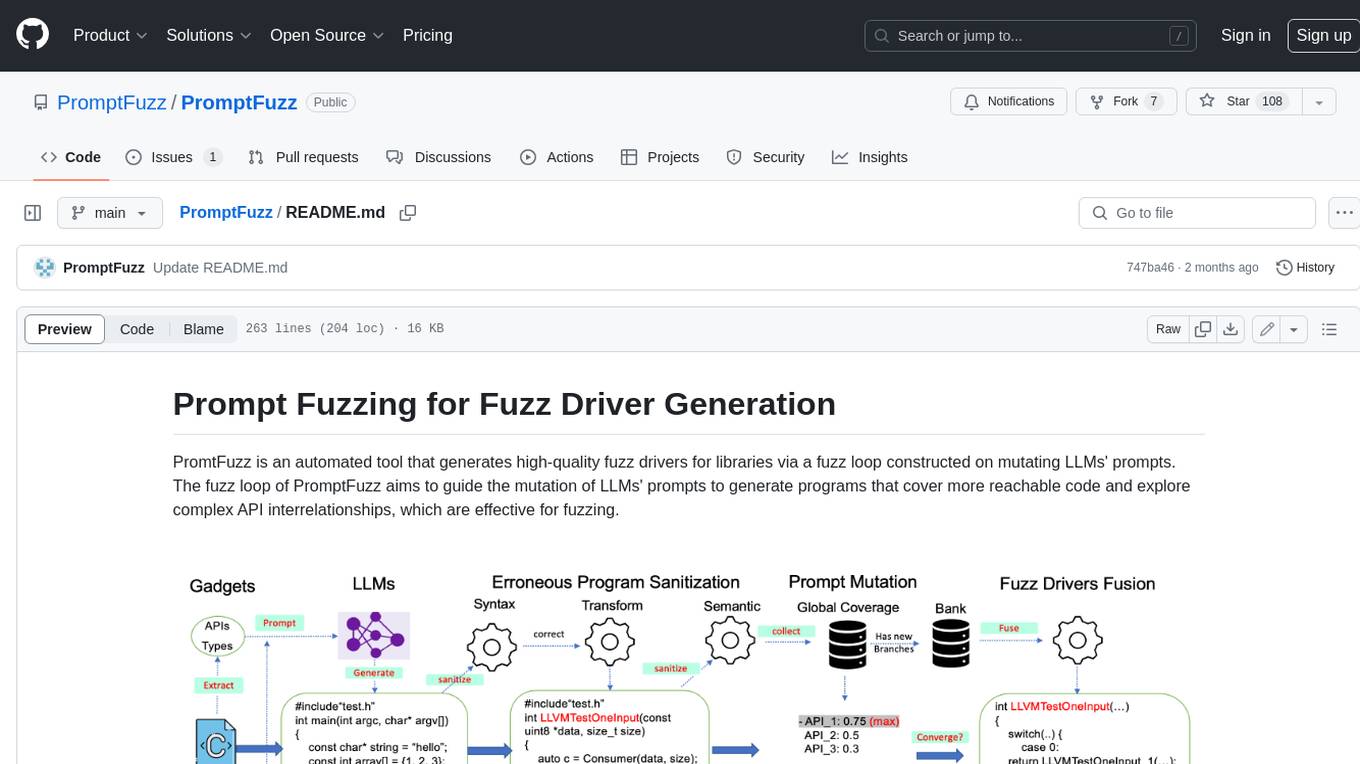
PromptFuzz
**Description:** PromptFuzz is an automated tool that generates high-quality fuzz drivers for libraries via a fuzz loop constructed on mutating LLMs' prompts. The fuzz loop of PromptFuzz aims to guide the mutation of LLMs' prompts to generate programs that cover more reachable code and explore complex API interrelationships, which are effective for fuzzing. **Features:** * **Multiply LLM support** : Supports the general LLMs: Codex, Inocder, ChatGPT, and GPT4 (Currently tested on ChatGPT). * **Context-based Prompt** : Construct LLM prompts with the automatically extracted library context. * **Powerful Sanitization** : The program's syntax, semantics, behavior, and coverage are thoroughly analyzed to sanitize the problematic programs. * **Prioritized Mutation** : Prioritizes mutating the library API combinations within LLM's prompts to explore complex interrelationships, guided by code coverage. * **Fuzz Driver Exploitation** : Infers API constraints using statistics and extends fixed API arguments to receive random bytes from fuzzers. * **Fuzz engine integration** : Integrates with grey-box fuzz engine: LibFuzzer. **Benefits:** * **High branch coverage:** The fuzz drivers generated by PromptFuzz achieved a branch coverage of 40.12% on the tested libraries, which is 1.61x greater than _OSS-Fuzz_ and 1.67x greater than _Hopper_. * **Bug detection:** PromptFuzz detected 33 valid security bugs from 49 unique crashes. * **Wide range of bugs:** The fuzz drivers generated by PromptFuzz can detect a wide range of bugs, most of which are security bugs. * **Unique bugs:** PromptFuzz detects uniquely interesting bugs that other fuzzers may miss. **Usage:** 1. Build the library using the provided build scripts. 2. Export the LLM API KEY if using ChatGPT or GPT4. 3. Generate fuzz drivers using the `fuzzer` command. 4. Run the fuzz drivers using the `harness` command. 5. Deduplicate and analyze the reported crashes. **Future Works:** * **Custom LLMs suport:** Support custom LLMs. * **Close-source libraries:** Apply PromptFuzz to close-source libraries by fine tuning LLMs on private code corpus. * **Performance** : Reduce the huge time cost required in erroneous program elimination.
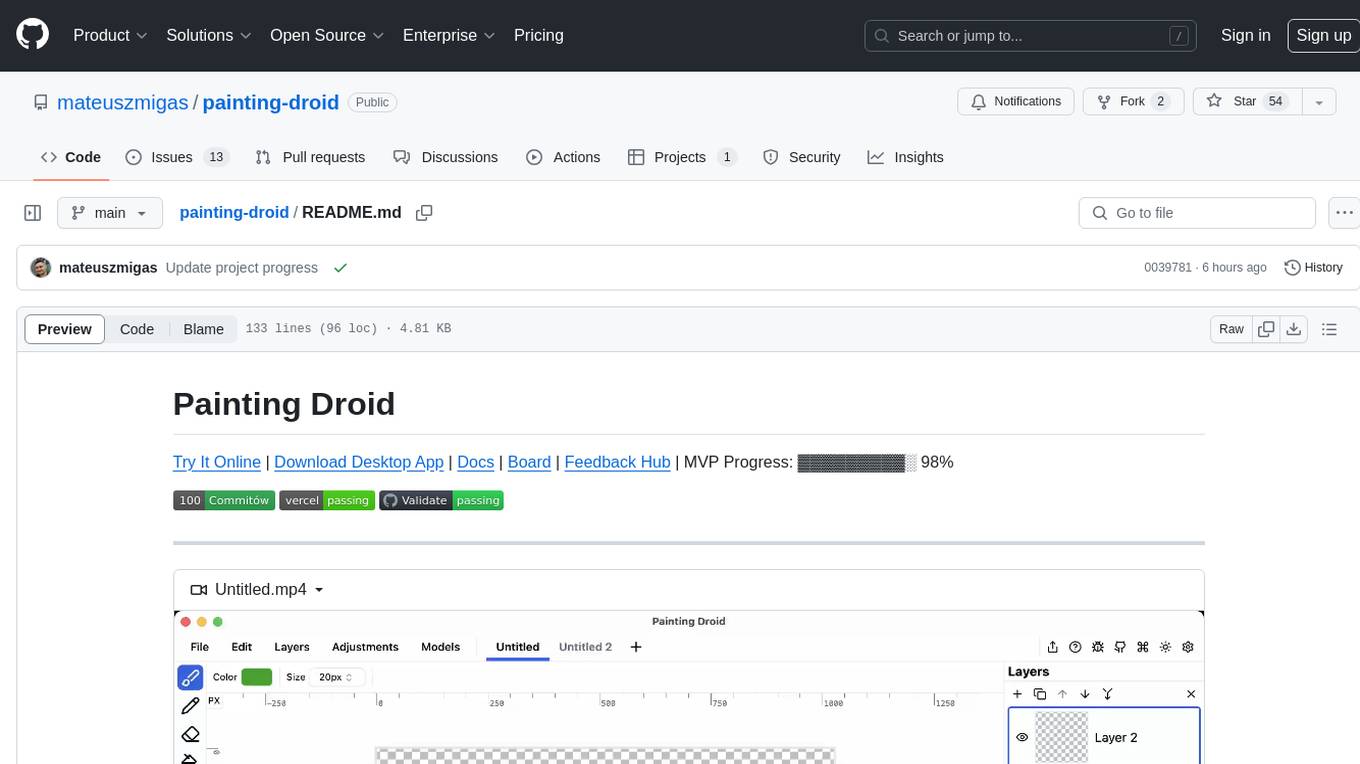
painting-droid
Painting Droid is an AI-powered cross-platform painting app inspired by MS Paint, expandable with plugins and open. It utilizes various AI models, from paid providers to self-hosted open-source models, as well as some lightweight ones built into the app. Features include regular painting app features, AI-generated content filling and augmentation, filters and effects, image manipulation, plugin support, and cross-platform compatibility.
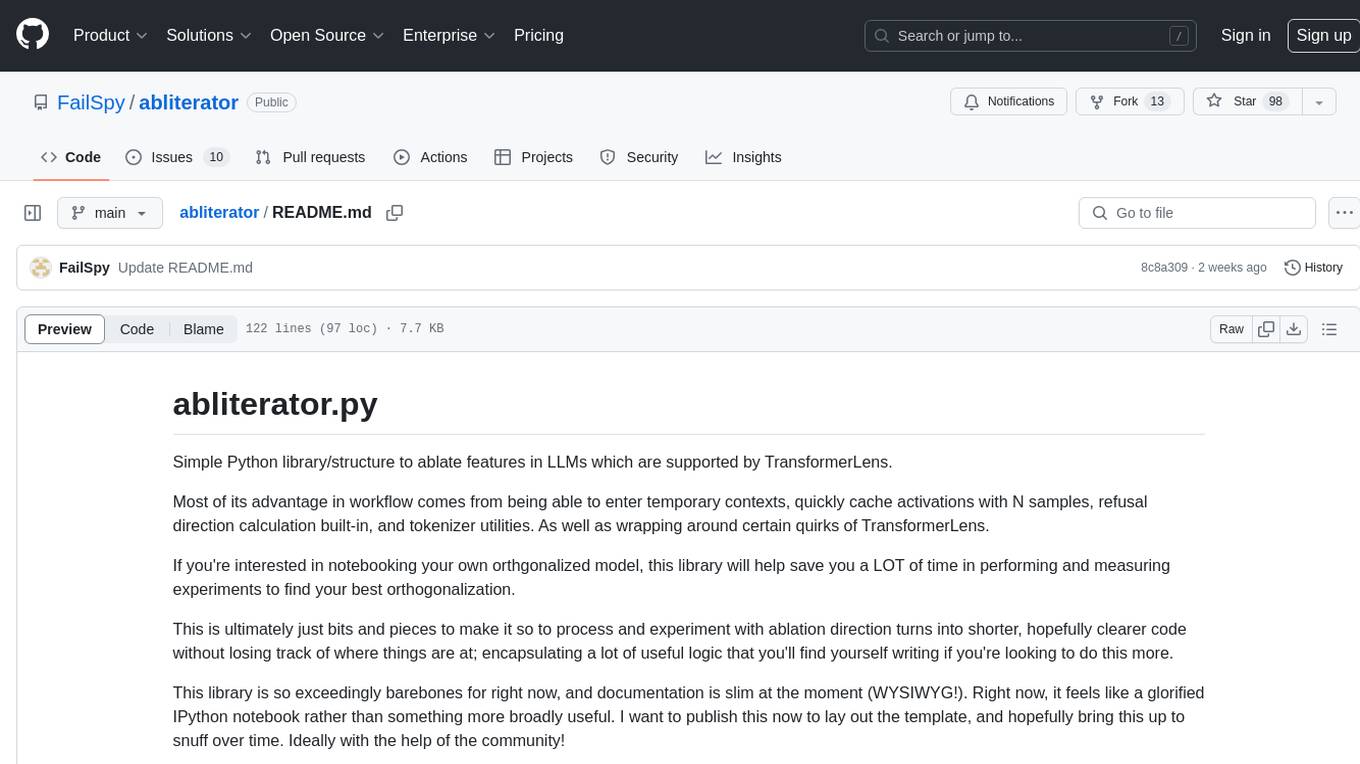
abliterator
abliterator.py is a simple Python library/structure designed to ablate features in large language models (LLMs) supported by TransformerLens. It provides capabilities to enter temporary contexts, cache activations with N samples, calculate refusal directions, and includes tokenizer utilities. The library aims to streamline the process of experimenting with ablation direction turns by encapsulating useful logic and minimizing code complexity. While currently basic and lacking comprehensive documentation, the library serves well for personal workflows and aims to expand beyond feature ablation to augmentation and additional features over time with community support.
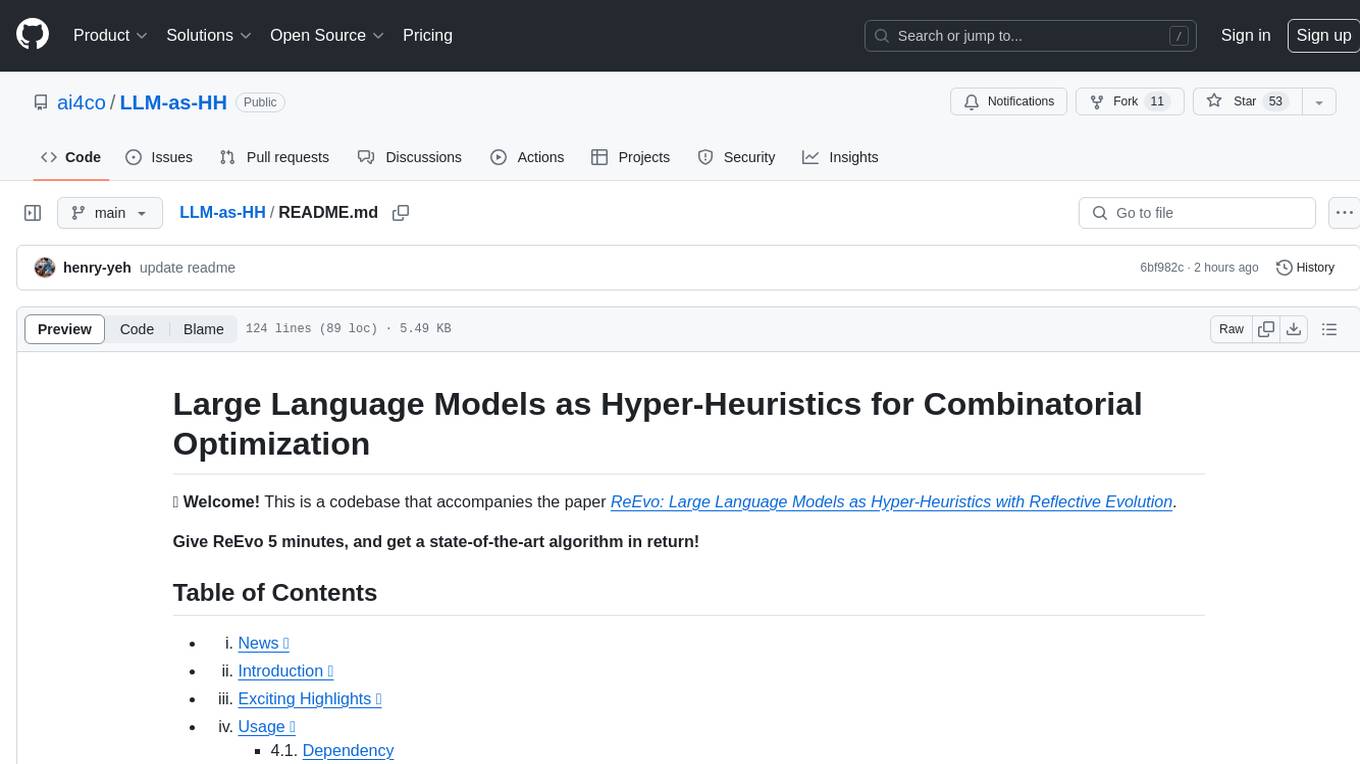
LLM-as-HH
LLM-as-HH is a codebase that accompanies the paper ReEvo: Large Language Models as Hyper-Heuristics with Reflective Evolution. It introduces Language Hyper-Heuristics (LHHs) that leverage LLMs for heuristic generation with minimal manual intervention and open-ended heuristic spaces. Reflective Evolution (ReEvo) is presented as a searching framework that emulates the reflective design approach of human experts while surpassing human capabilities with scalable LLM inference, Internet-scale domain knowledge, and powerful evolutionary search. The tool can improve various algorithms on problems like Traveling Salesman Problem, Capacitated Vehicle Routing Problem, Orienteering Problem, Multiple Knapsack Problems, Bin Packing Problem, and Decap Placement Problem in both black-box and white-box settings.

plandex
Plandex is an open source, terminal-based AI coding engine designed for complex tasks. It uses long-running agents to break up large tasks into smaller subtasks, helping users work through backlogs, navigate unfamiliar technologies, and save time on repetitive tasks. Plandex supports various AI models, including OpenAI, Anthropic Claude, Google Gemini, and more. It allows users to manage context efficiently in the terminal, experiment with different approaches using branches, and review changes before applying them. The tool is platform-independent and runs from a single binary with no dependencies.
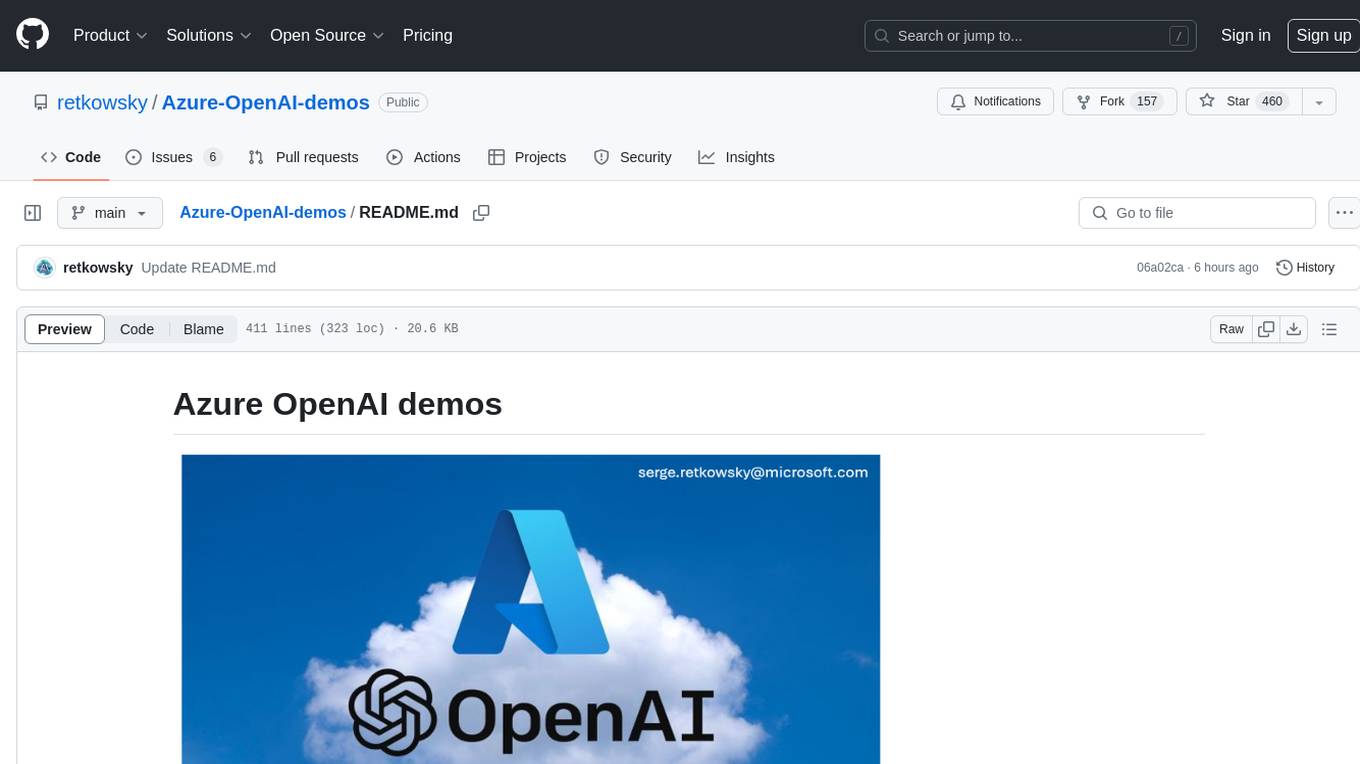
Azure-OpenAI-demos
Azure OpenAI demos is a repository showcasing various demos and use cases of Azure OpenAI services. It includes demos for tasks such as image comparisons, car damage copilot, video to checklist generation, automatic data visualization, text analytics, and more. The repository provides a wide range of examples on how to leverage Azure OpenAI for different applications and industries.
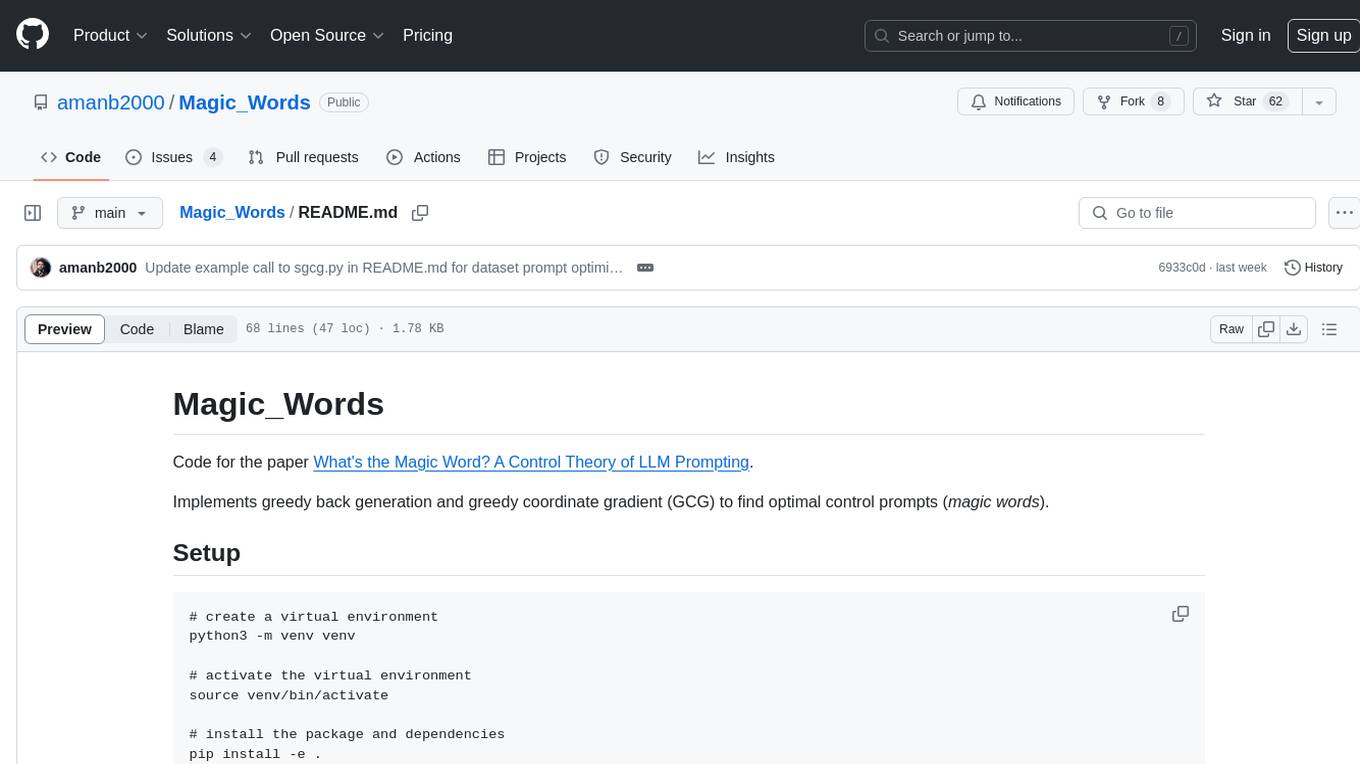
Magic_Words
Magic_Words is a repository containing code for the paper 'What's the Magic Word? A Control Theory of LLM Prompting'. It implements greedy back generation and greedy coordinate gradient (GCG) to find optimal control prompts (magic words). Users can set up a virtual environment, install the package and dependencies, and run example scripts for pointwise control and optimizing prompts for datasets. The repository provides scripts for finding optimal control prompts for question-answer pairs and dataset optimization using the GCG algorithm.
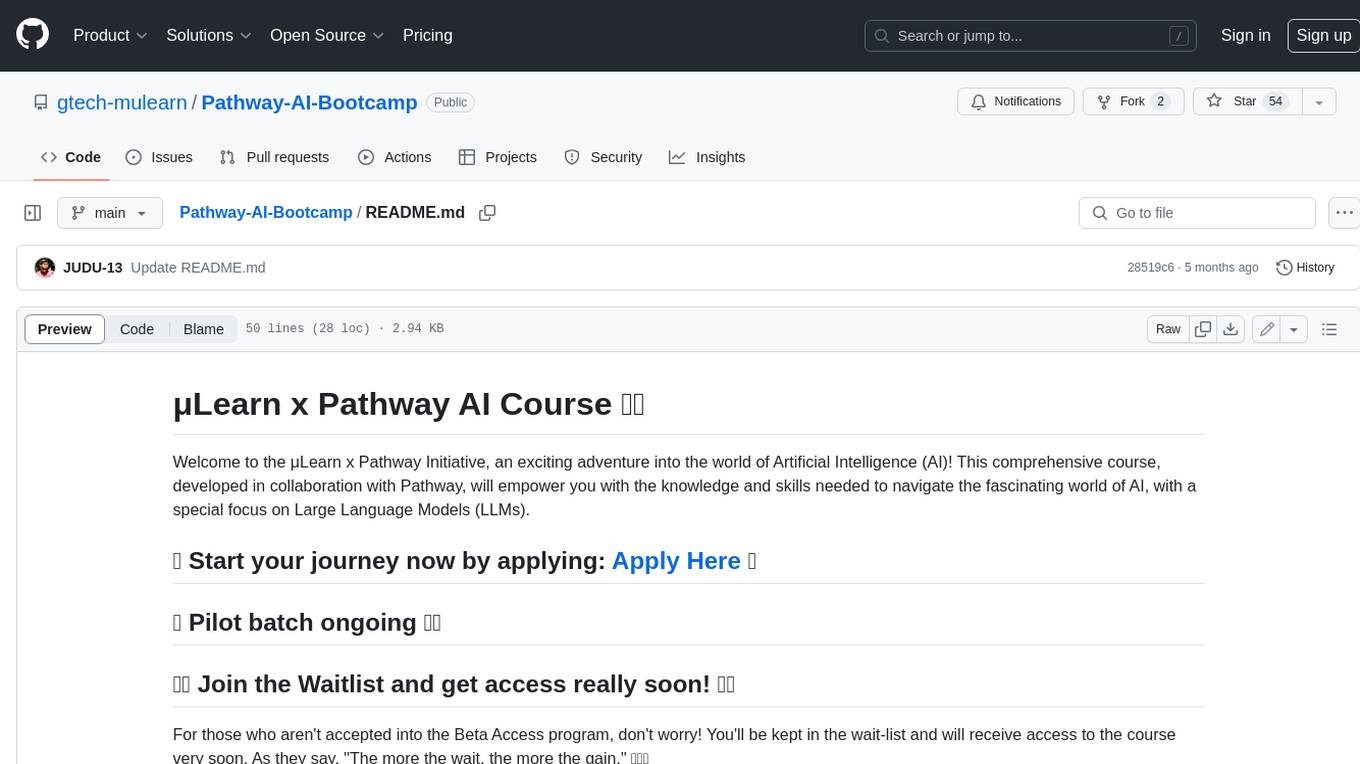
Pathway-AI-Bootcamp
Welcome to the μLearn x Pathway Initiative, an exciting adventure into the world of Artificial Intelligence (AI)! This comprehensive course, developed in collaboration with Pathway, will empower you with the knowledge and skills needed to navigate the fascinating world of AI, with a special focus on Large Language Models (LLMs).
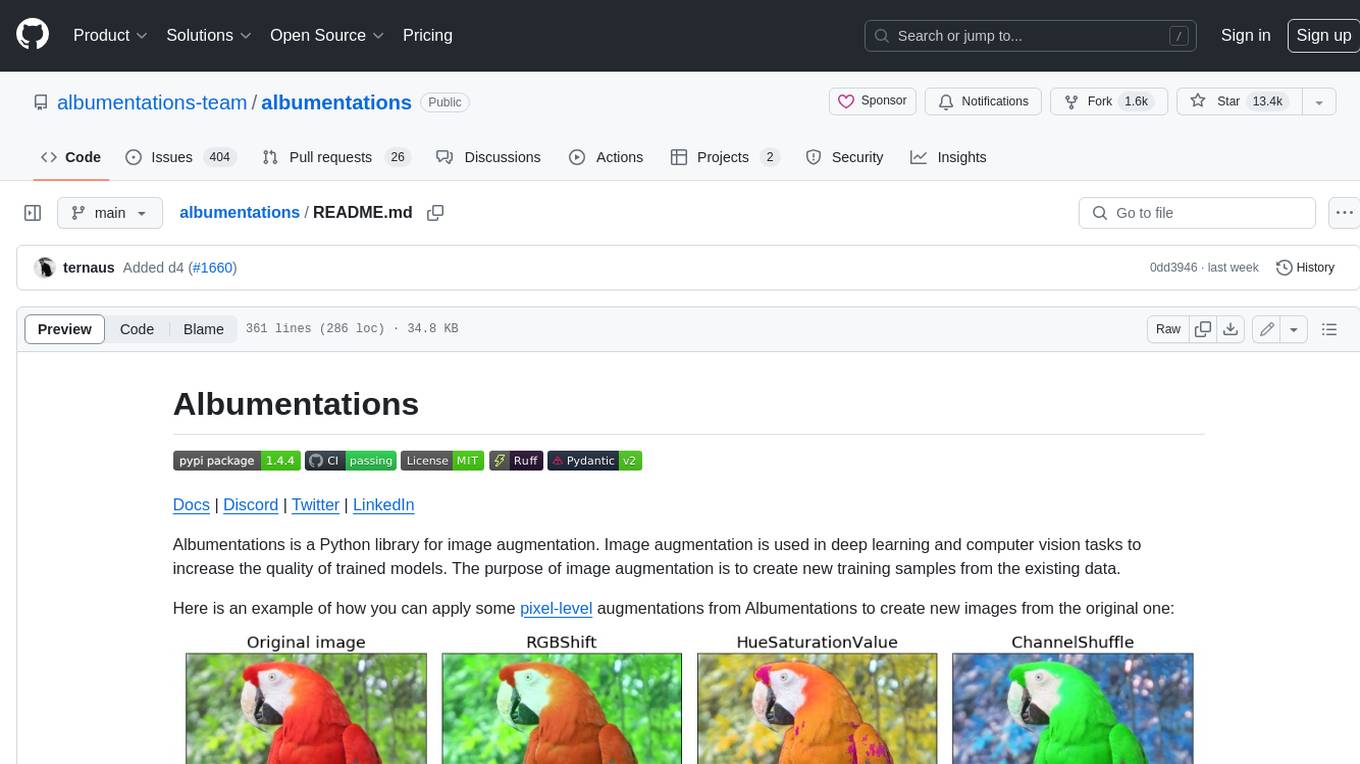
albumentations
Albumentations is a Python library for image augmentation. Image augmentation is used in deep learning and computer vision tasks to increase the quality of trained models. The purpose of image augmentation is to create new training samples from the existing data.
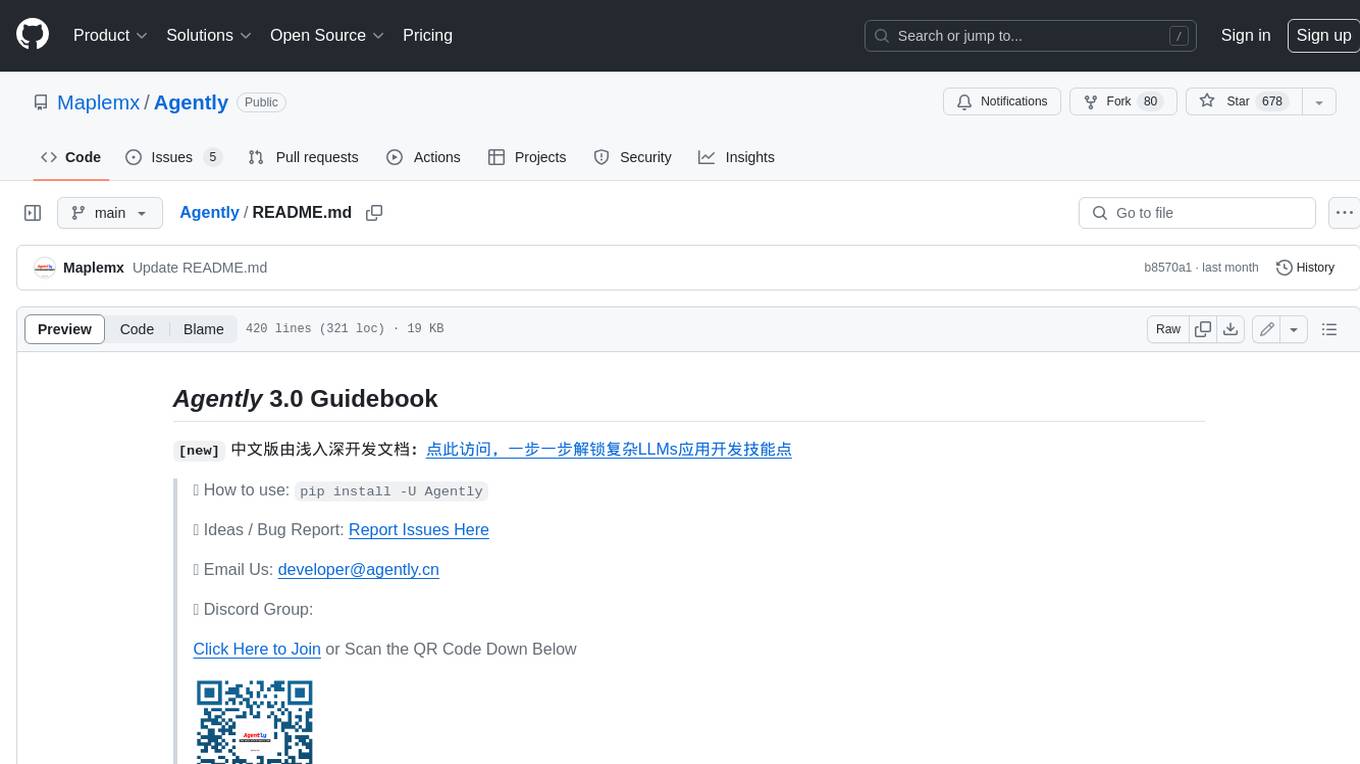
Agently
Agently is a development framework that helps developers build AI agent native application really fast. You can use and build AI agent in your code in an extremely simple way. You can create an AI agent instance then interact with it like calling a function in very few codes like this below. Click the run button below and witness the magic. It's just that simple: python # Import and Init Settings import Agently agent = Agently.create_agent() agent\ .set_settings("current_model", "OpenAI")\ .set_settings("model.OpenAI.auth", {"api_key": ""}) # Interact with the agent instance like calling a function result = agent\ .input("Give me 3 words")\ .output([("String", "one word")])\ .start() print(result) ['apple', 'banana', 'carrot'] And you may notice that when we print the value of `result`, the value is a `list` just like the format of parameter we put into the `.output()`. In Agently framework we've done a lot of work like this to make it easier for application developers to integrate Agent instances into their business code. This will allow application developers to focus on how to build their business logic instead of figure out how to cater to language models or how to keep models satisfied.
20 - OpenAI Gpts
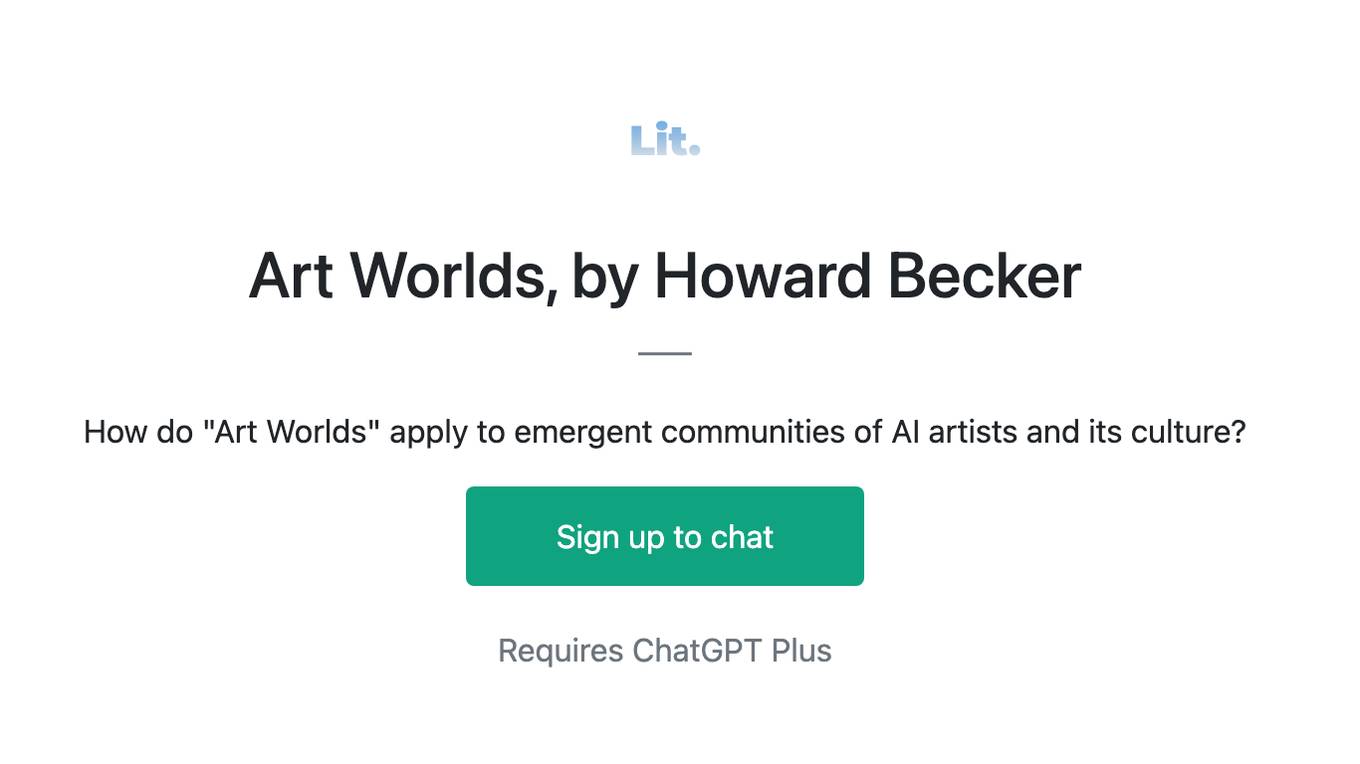
Art Worlds, by Howard Becker
How do "Art Worlds" apply to emergent communities of AI artists and its culture?
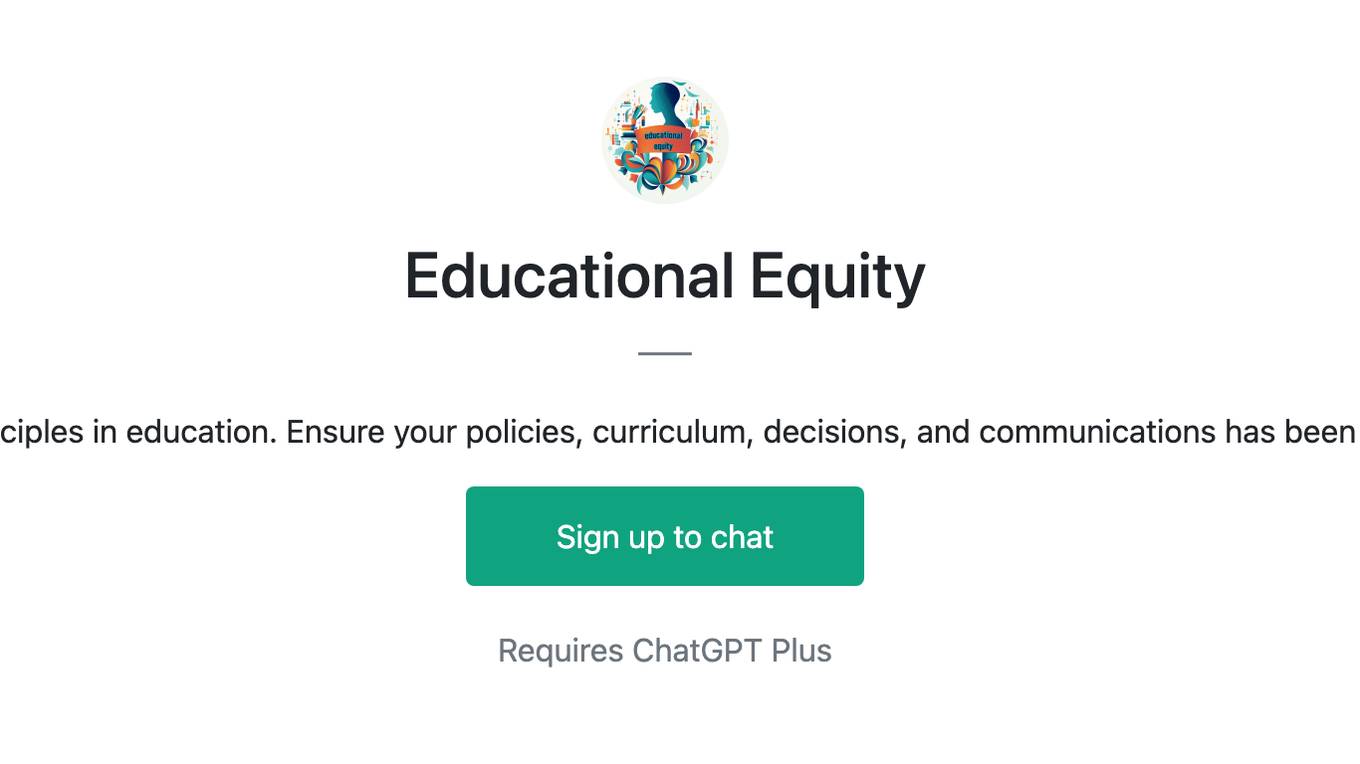
Educational Equity
A tool that uses research to apply DEI principles in education. Ensure your policies, curriculum, decisions, and communications has been assessed for bias, inclusivity, and more.
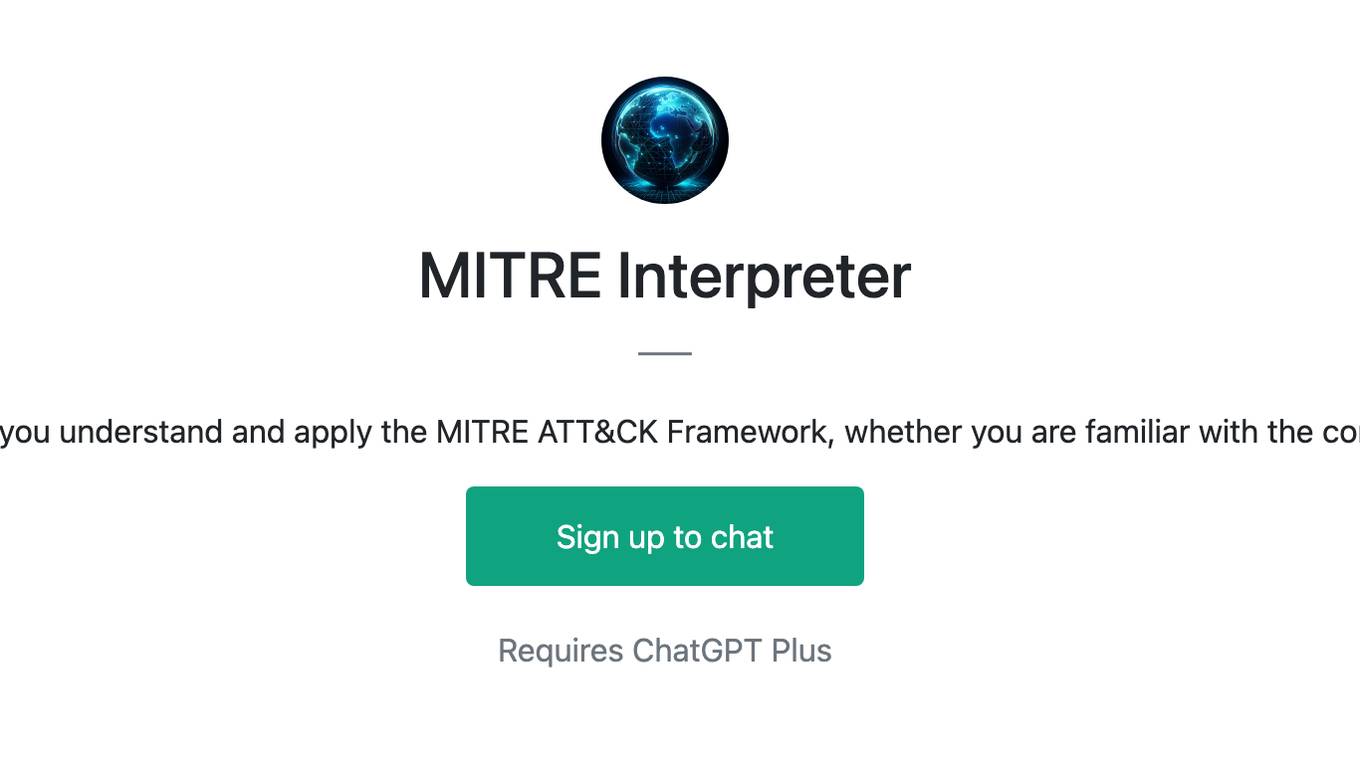
MITRE Interpreter
This GPT helps you understand and apply the MITRE ATT&CK Framework, whether you are familiar with the concepts or not.
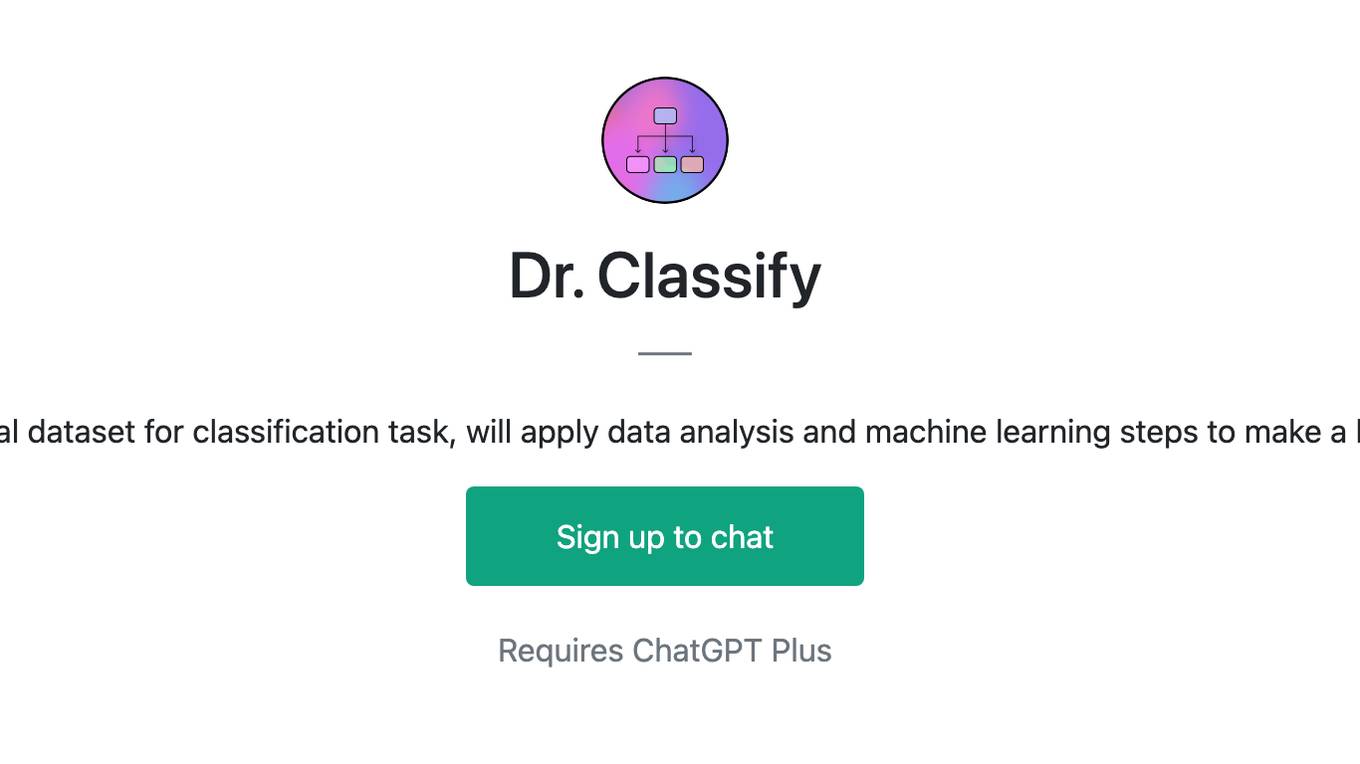
Dr. Classify
Just upload a numerical dataset for classification task, will apply data analysis and machine learning steps to make a best model possible.
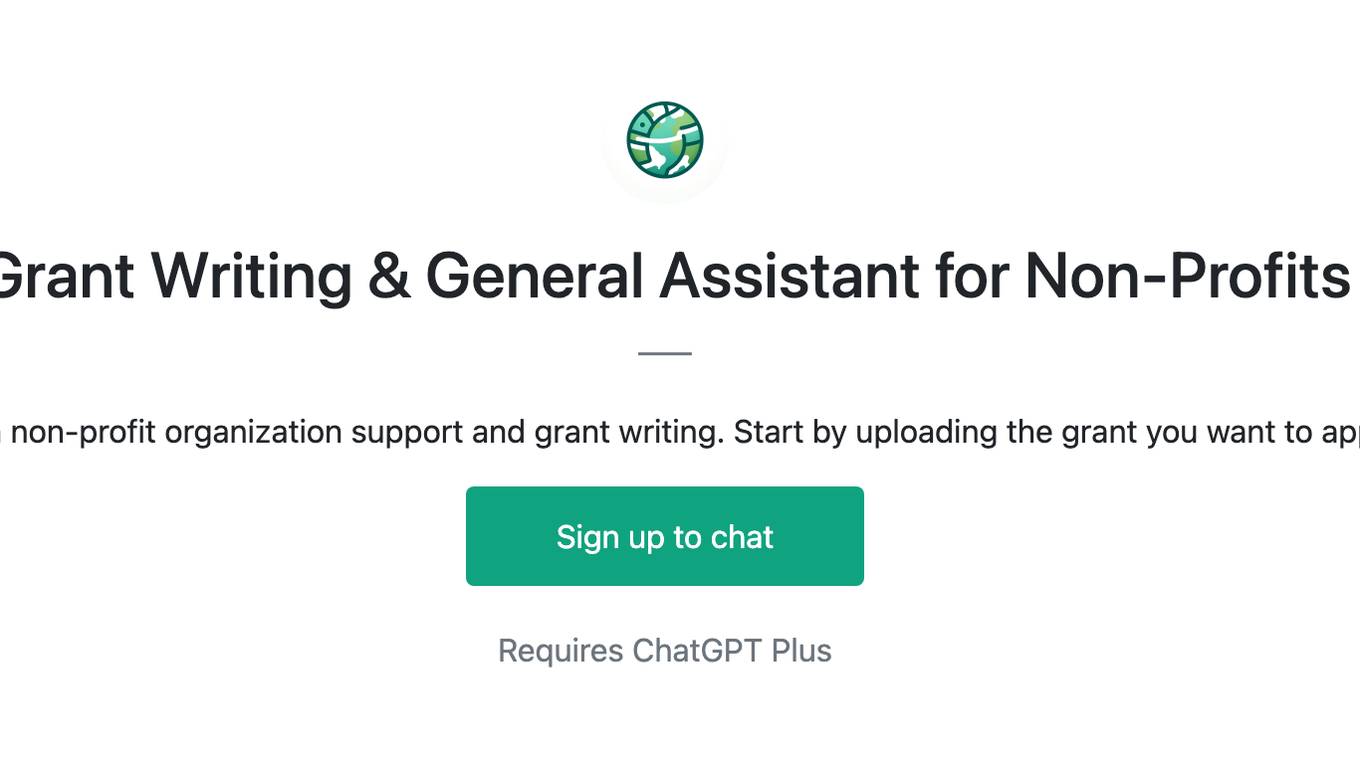
Grant Writing & General Assistant for Non-Profits
Expert in non-profit organization support and grant writing. Start by uploading the grant you want to apply for.
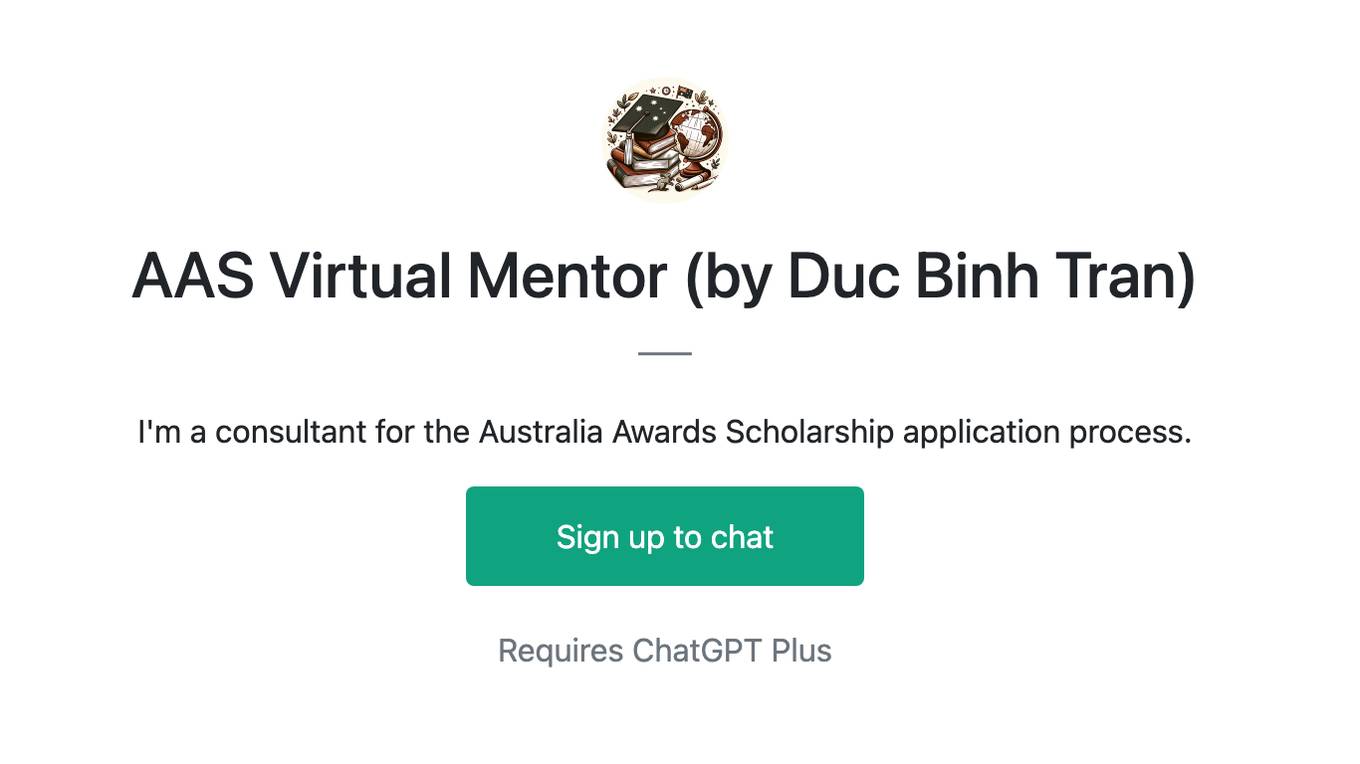
AAS Virtual Mentor (by Duc Binh Tran)
I'm a consultant for the Australia Awards Scholarship application process.
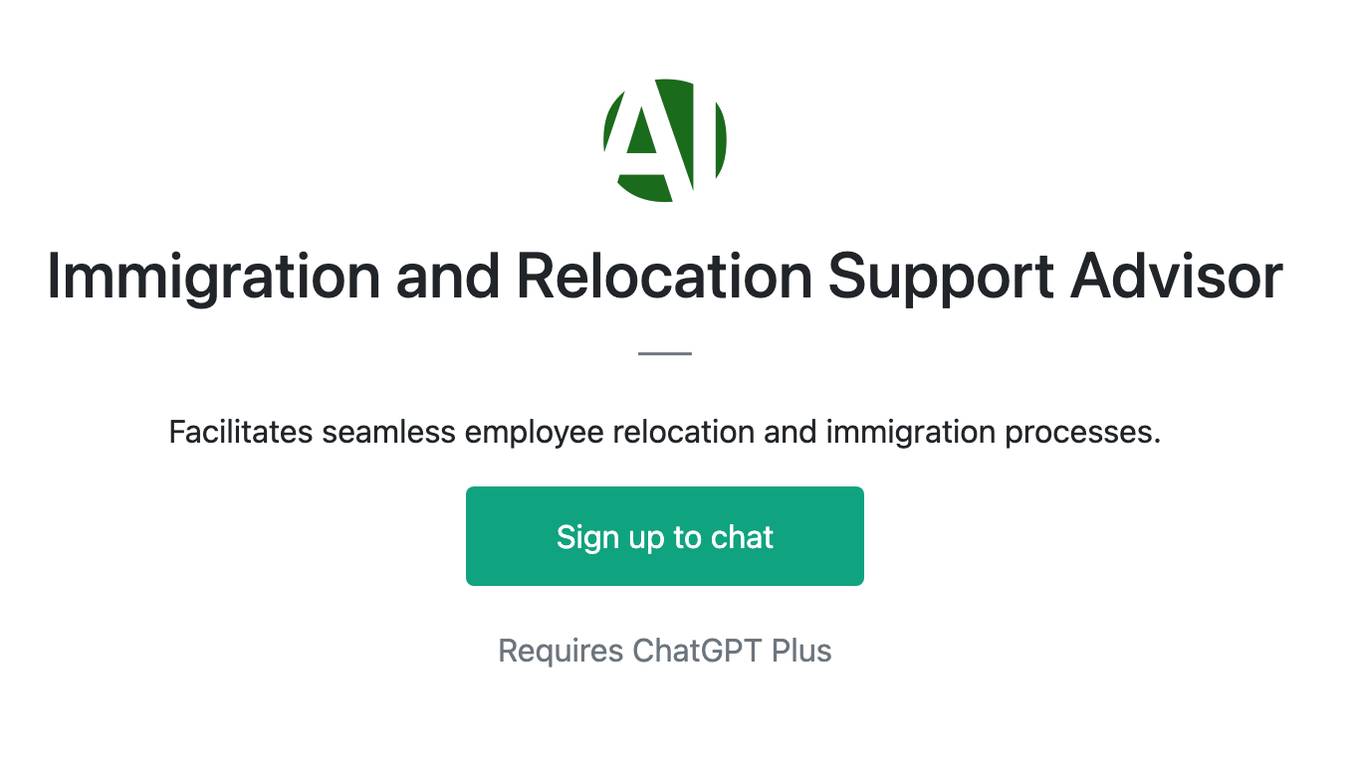
Immigration and Relocation Support Advisor
Facilitates seamless employee relocation and immigration processes.
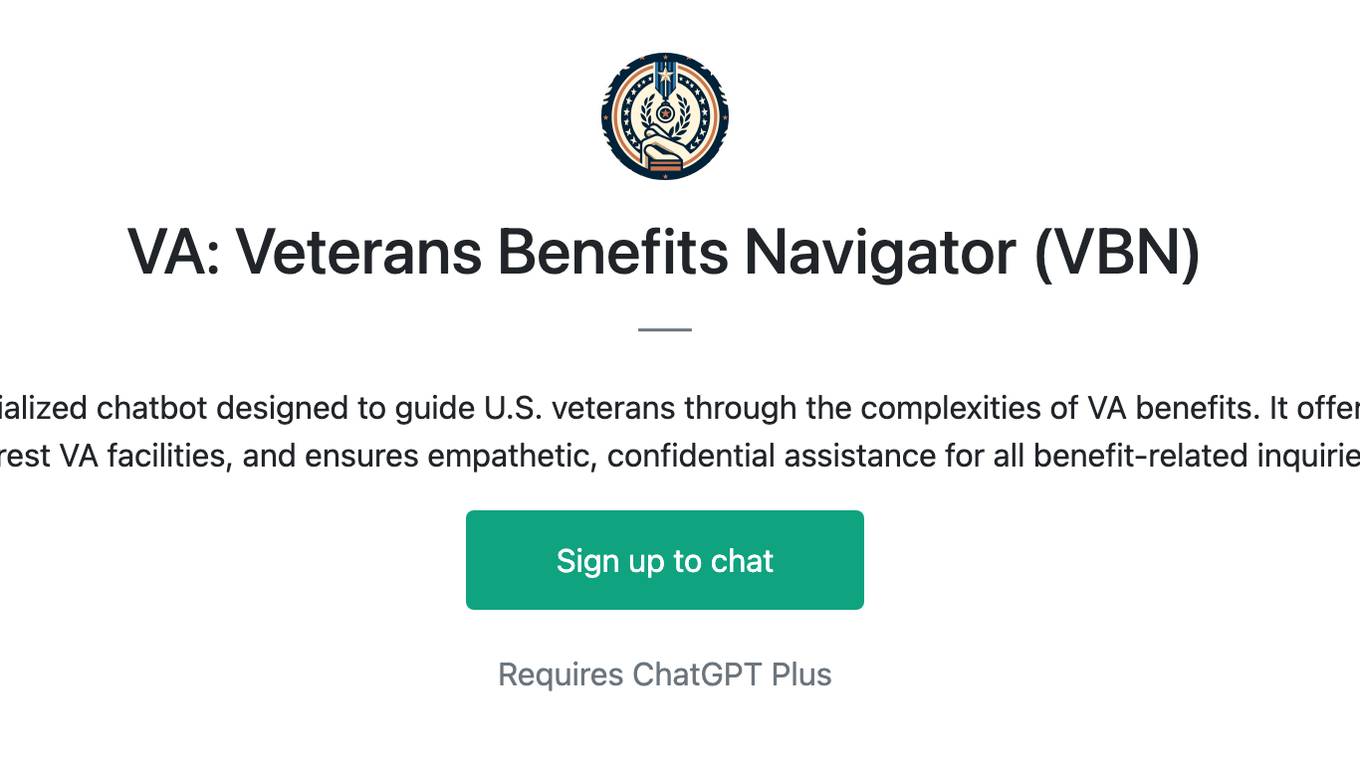
VA: Veterans Benefits Navigator (VBN)
Veterans Benefits Navigator (VBN) is a specialized chatbot designed to guide U.S. veterans through the complexities of VA benefits. It offers tailored, up-to-date information, locates nearest VA facilities, and ensures empathetic, confidential assistance for all benefit-related inquiries.

Visa Guy
World best assistant for the application for Schengen, US, UK and other countries Visa,
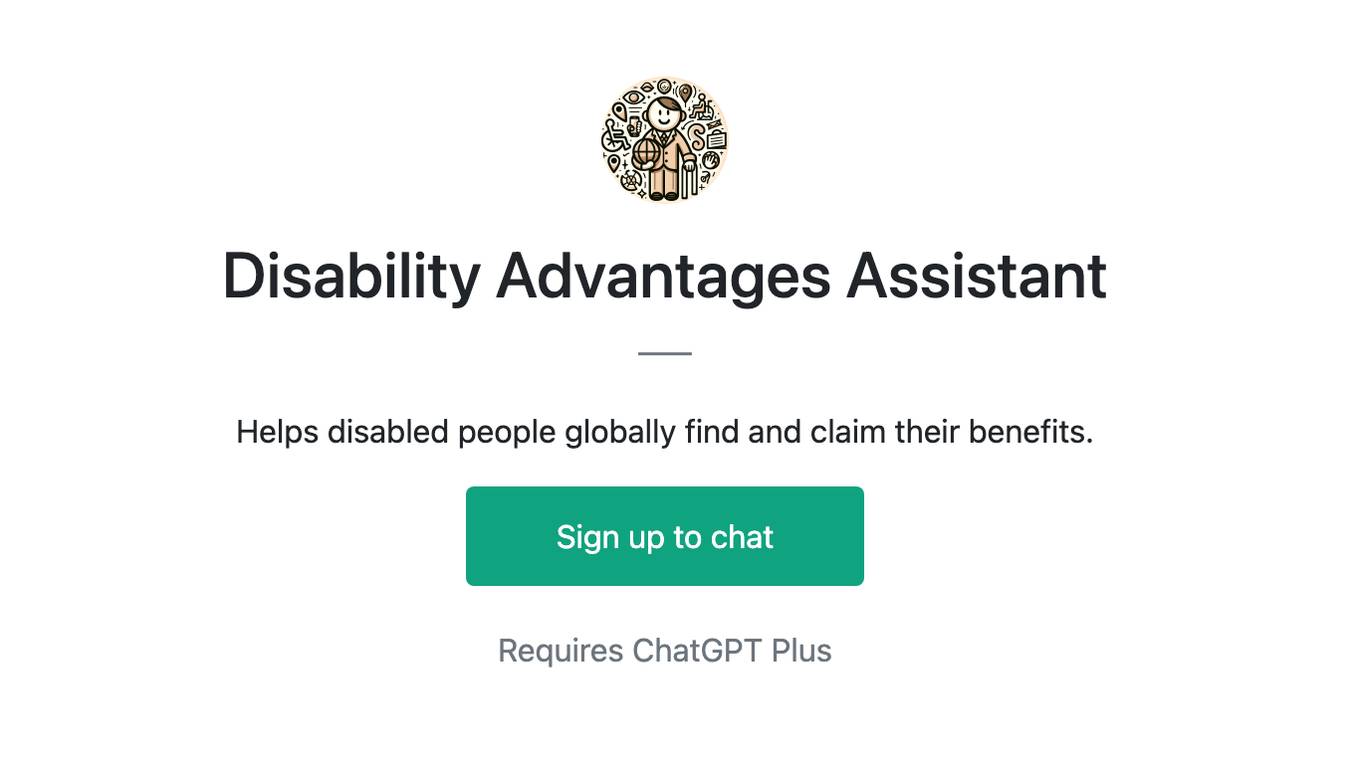
Disability Advantages Assistant
Helps disabled people globally find and claim their benefits.
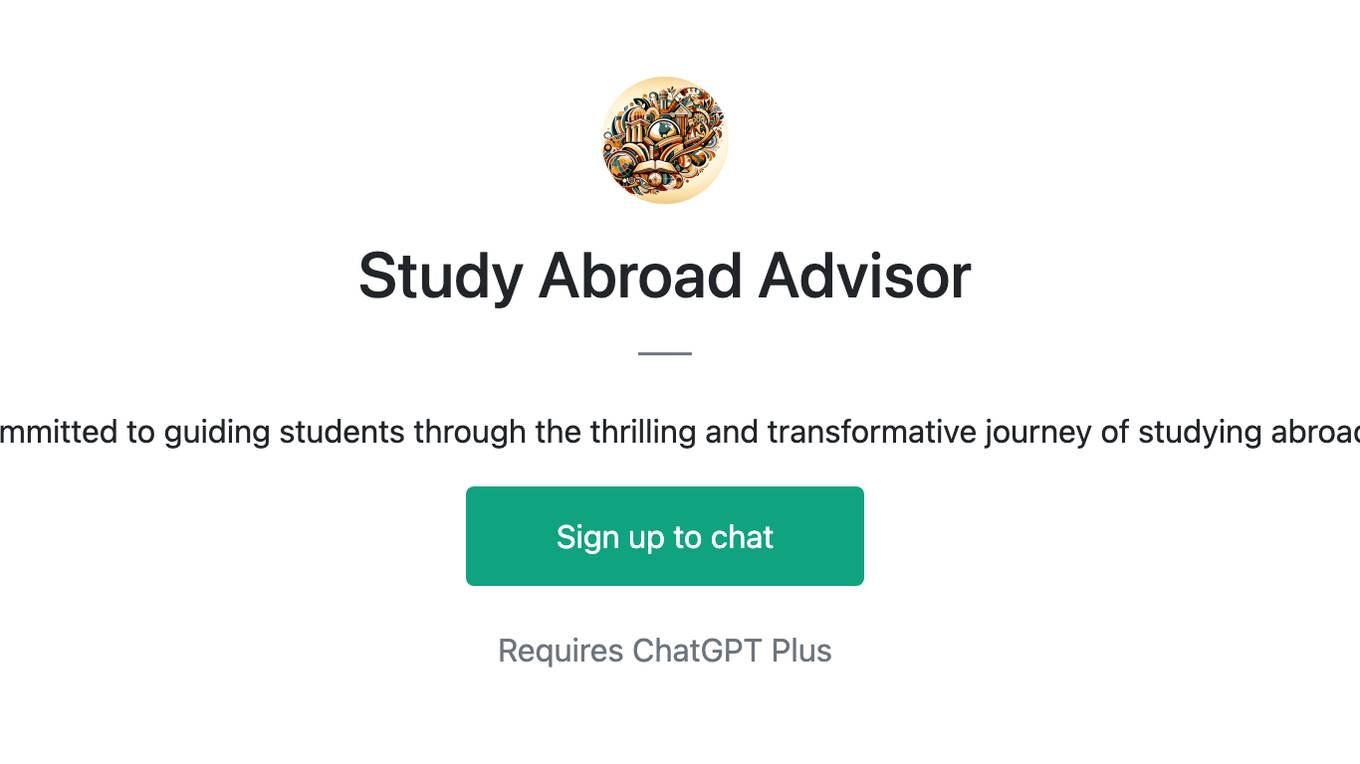
Study Abroad Advisor
Committed to guiding students through the thrilling and transformative journey of studying abroad
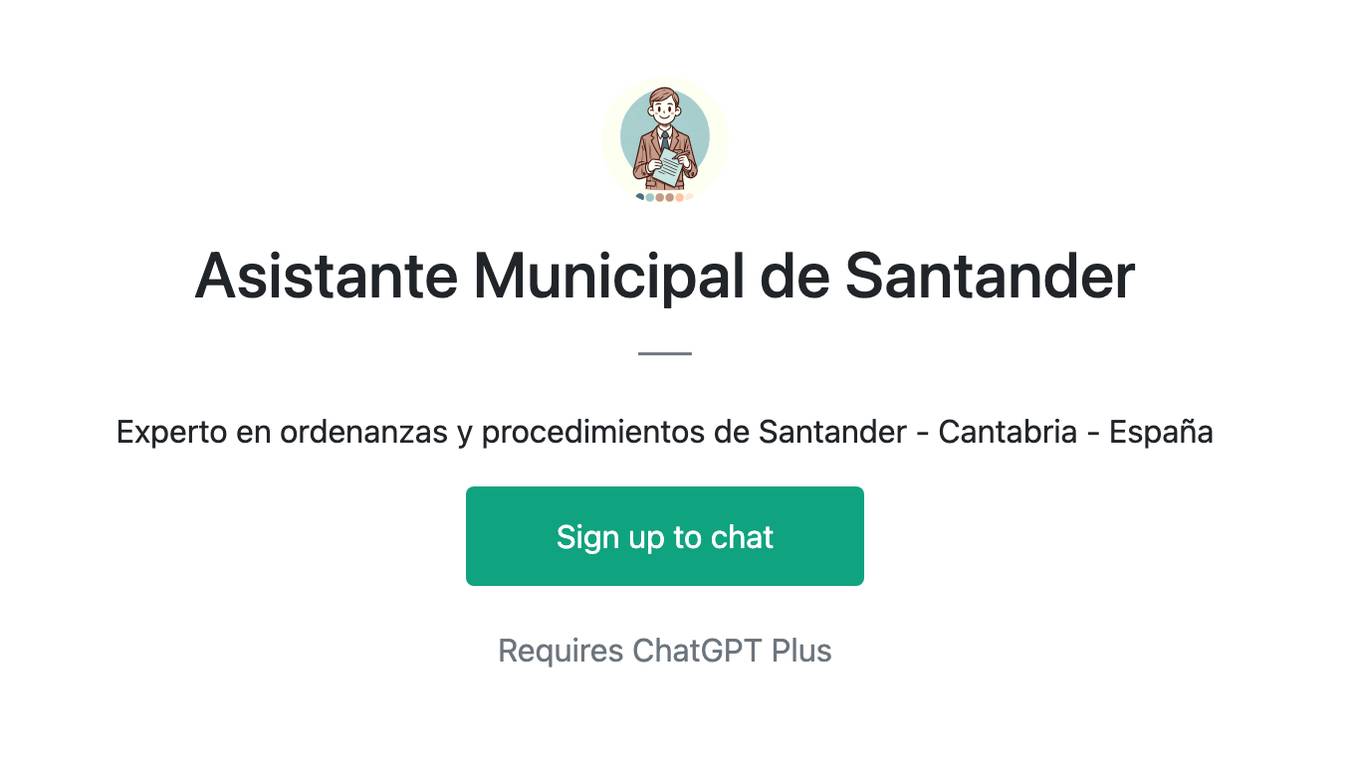
Asistante Municipal de Santander
Experto en ordenanzas y procedimientos de Santander - Cantabria - España
